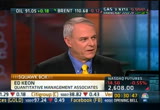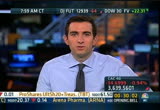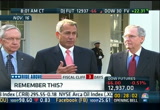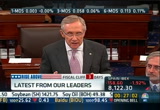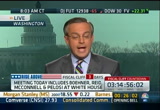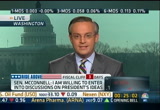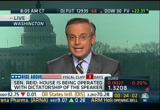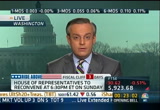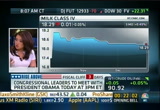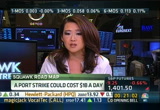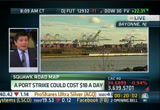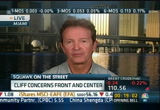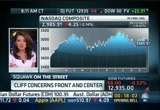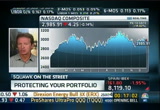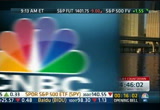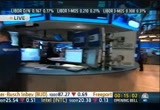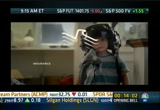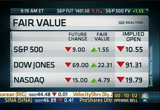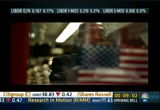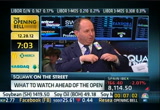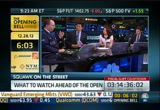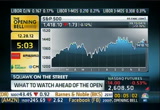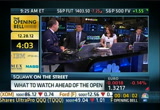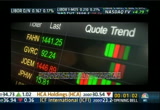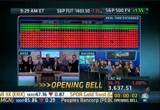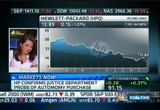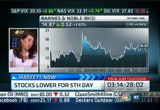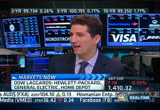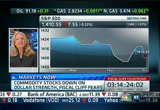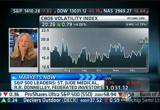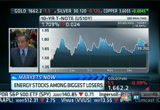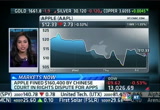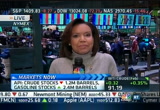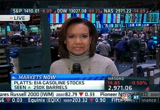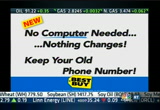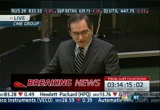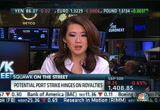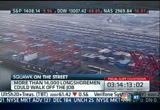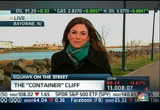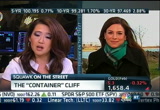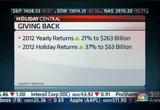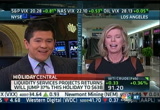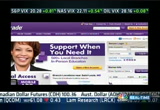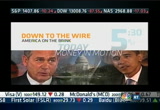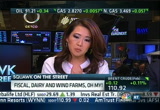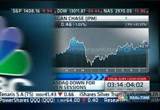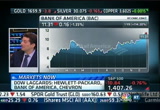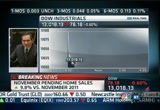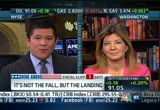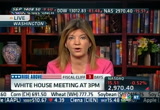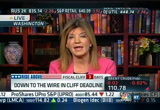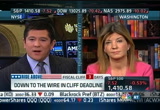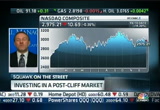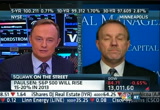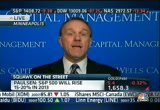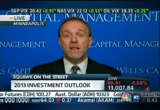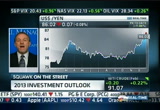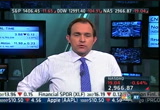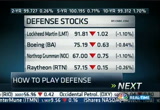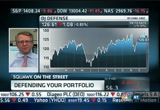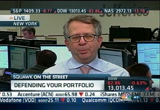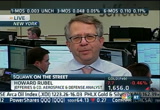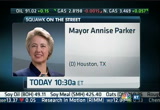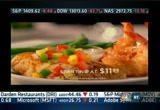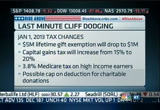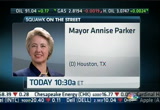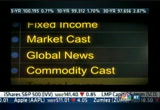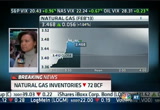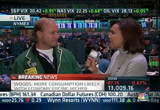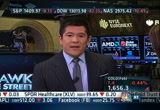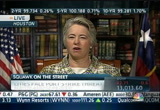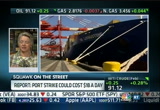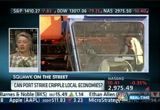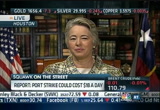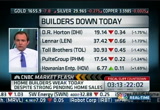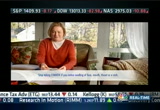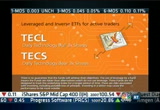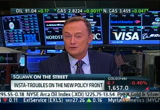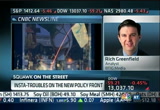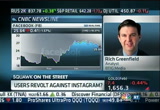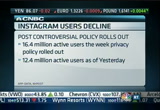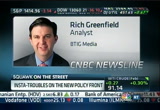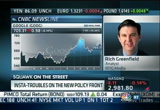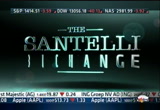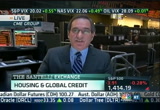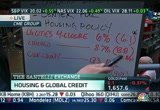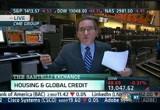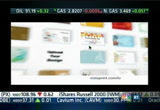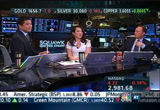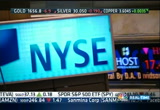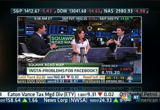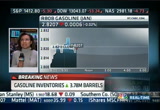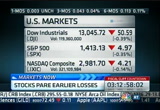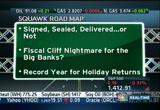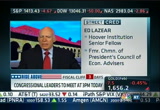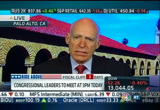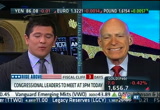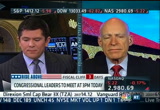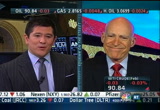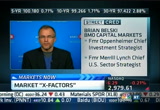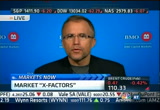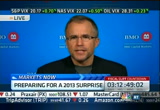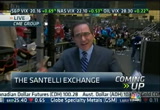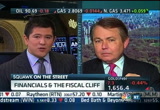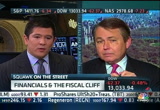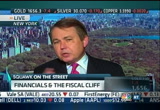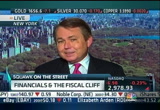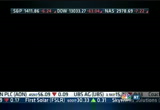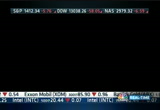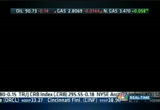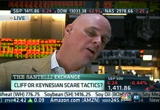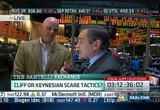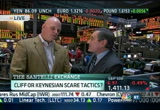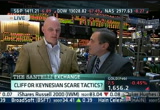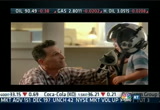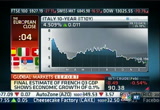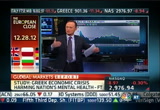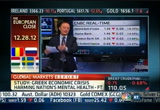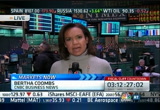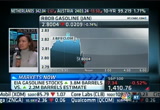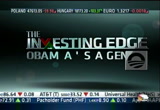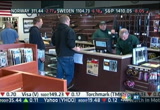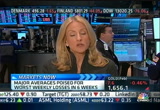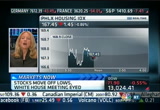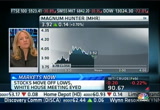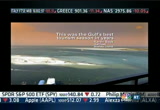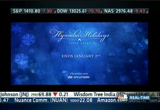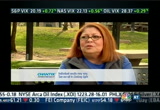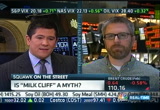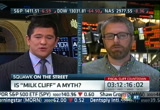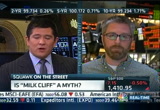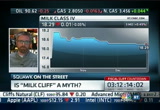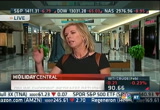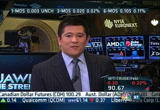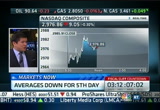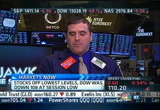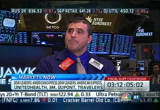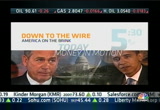tv Squawk on the Street CNBC December 28, 2012 9:00am-12:00pm EST
9:00 am
february, i think the underlying strength of the economy is actually better than people think. >> 3% would ease pressure on both sides. >> would change everything. john? >> well, joe just said it. i'm not a wildist prediction kind of guy, but i actually think that congress and the president are going to surprise us and we're going to get a deal that has some integrity. and i've said before, if we get anything that makes meaningful step towards fixing our fiscal problem, you're going to see the market go up a couple thousand points. i think that is a, you know, 20% chance in 2013. i think we could really go some place, if politicians show some leadership. >> that's only 20% that they have integrity. >> yeah, yeah. that's up from earlier today. >> thank you, john, thank you guys for being with us today. make sure you join us on monday. "squawk on the street" begins right now.
9:01 am
♪ good friday morning. welcome to "squawk on the street" on this final friday trading session of the year. i'm carl quintanilla at the new york stock exchange, along with melissa lee. >> that's a good song. >> i actually requested that a few moments ago. cramer and faber had the day off. the market has a few jitters as we enter what is going to be an interesting day. of course, the meeting at the white house, 3:00 between the president and some congressional leaders. as for europe, getting some data out of japan overnight and some data out of europe. currently red arrows across the board, in london, paris, and frankfort. our road map begins at the white house. congressional leaders set to meet with the president, 3:00 p.m. this afternoon. senator reid has already said hopes of a deal are fading quickly. just two trading days left until the cliff. and it's not just the fiscal cliff. wind farms and dairy are set to get hit.
9:02 am
>> the ports of the east coast and gulf coast are bracing for a potential strike. the potential for this, midnight sunday with a shutdown threatening to threaten 20% of the cargo traffic. >> and instagram feeling the sting of the flap around privacy with users, fleeing the site. how will this impact facebook? >> as we mentioned, dennis berman, "wall street journal" market place editor is joining us here on set once again for the next hour. good to have you back, dennis. lots to talk about between the cliff and other news. >> three days before the u.s. goes over the fiscal cliff, congressional leaders will meet with the president this afternoon. i remember standing on the white house north lawn last month, after leaders met with the president back then. things looked pretty promising. here's what they said after that meeting. >> i believe that the framework that i've outlined in our meeting today is consistent with the president's call for a fair and balanced approach. >> i feel confident that a
9:03 am
solution may be in sight. >> it was a constructive meeting. we all understand where we are. >> we feel very comfortable with each other and this isn't something we're going to wait until the last day of december to get it done. >> isn't that special? now we're in the last days of december. and with just three days to go, the rhetoric has changed in the beltway. these are the latest comments. >> republicans aren't about to write a blank check for anything senate democrats put forward, just because we find ourselves at the edge of the cliff. that wouldn't be fair to the american people. >> the president's presented to him something that would prevent us from going over the cliff. it was in response to something the speaker gave to the president himself, but again, i guess with the dysfunctional republican caucus in the house, even the speaker can't tell what they're going to do.
9:04 am
>> i don't want taxes to go up. republicans don't want taxes to go up. but we only run the house. democrats continue to run washington. >> call me a hopeless optimist, but i actually still think we can get it done. >> eamon javers live in washington. eamon, fascinating to look at that tape in retrospect. >> i think a lot of people in washington think the make-or-break deal making sessions have already happened here. and one republican senator i talked to this morning said there are very low expectations now for this meeting at the white house today. and boy, how times have changed, carl. just watching that tape that you just ran. one of the things that i'll be watching for when i'm standing on the white house north lawn this afternoon is whether or not these four congressional leaders come out as they did back in november and talk to the press after the meeting. we've had a lot of meetings at the white house where people have left very quickly, gotten
9:05 am
into a suv and driven off the complex without talking to reporters. if they come out to those microphones after this meeting and come out together, i think that will be a hopeful sign that people will be looking for. but like i said, very low expectations here. the house will be in on sunday, in case there's anything to vote on by 6:30 p.m., when they come back into session. but meanwhile, the deal making and the talking continues. it's just not clear that they can get there until after we've gone after the cliff. >> eamon, as an average american sitting here on set, i wonder about the meeting at 3:00. wli why not earlier? the clock is ticking, why don't these guys get together sooner, so if there's something to talk about, they can hammer it out before the house reconvenes on sunday? >> it's a good yes. you would think that none of these people have anything on their schedule more important than this meeting. so why are they waiting in l the end of the day to do it? that's an open question. we know the vice president will be there, all four congressional
9:06 am
leaders will be there, but presumably, their schedules are pretty much centered around this fiscal cliff thing at this point, and they're all in town, as we know. >> eamon, what's the mood there in washington? there's so much talk, so much anger from the rest of the country directed another washington. is it seeping through the iron wall that's around the beltway or is it -- >> it is. it is. you know, look, they definitely feel it. and they feel the country's frustration. i talked to, again, this one republican senator this morning who said they were getting realtime updates yesterday as the stock market was swinging wildly in response to what was going on in washington on the fiscal cliff. so they know this is angering people and they know this is affecting people's fortunes and livelihoods. but what they don't want to do is give up on deeply held principles. and a lot of these house members got elected in districts that don't look anything like the rest of america. they're very extreme, gerrymandered districts in many case s with
9:07 am
ca ca ca cases, and their own personal careers depend much more on how they're perceived back at home. so they don't necessarily care that this is one of the most unpopular congresses in recent history and one of the most unproductive congresses in recent history. they want to stick by their principles. >> it's true. and a lot of them say, eamon, i've been elected to be a check on the president and that's what a lot of this is about. >> right. this is deeply held, fundamental belief on both sides and there's a huge chasm between the two sides on these issues. and somebody's going to be a loser here if there's a deal. somebody's going to be perceived as having gotten rolled and neither side wants to be the party who got rolled here. i think both sides are looking at if fiscal cliff right now and saying, well, we could go over this thing. it wouldn't be the end of the world and that's a very different view in washington than it is on wall street. i can tell you that.
9:08 am
>> eamon, thanks. i know you've got a long day ahead, a long afternoon as well. eamon javers in washington. >> isn't it unbelievable. you have this huge, looming problem, i'll wait until later this afternoon to deal with it. >> and the whole sequester was a way to deal with this later. and corker, i think, on some of the morning shows this morning, senator corker said the worst case today would be to set up another later deadline that would keep the hard questions -- >> and i think a lot of this is so abstract, but if those milk prices go up for people around this country, that's going to be the thing that gets people really animated. >> that and payroll taxes, if they go up, that will hit a lot of americans across the board. >> interesting to see a lot of the stocks today that have exposure to dairy futures, whether it's an hsy, who knows?
9:09 am
i haven't even gone through the whole list, but a lot of them are going to be seeing some action today. >> and it was crazy yesterday, watching that market. it was a little bit after we left the set yesterday morning, but watching it in the afternoon, there was information about scott brown, and oh, there is going to be a call to bring congress back in. it was amazing to see the market on that -- >> scott brown bottom, as a lot of people were calling it. you were down more than 51. >> and it is amazing to see how our fortunes are being tied the at this point to what is going on in d.c. and every minor tweet or post or headline or what not, at the end of the day, it was four straight losing sessions for the dow, nasdaq, as well as the s&p 500. certainly something we have to watch. in the meantime, the clock is not only ticking for the fiscal cliff, but time is running out to avoid a strike at ports in massachusetts and texas, that could affect containers to and from the u.s. from reaching their destination. talks are taking place in secrecy between the
9:10 am
international long shoresman association and the u.s. maritime alliance in an effort to keep 14,000 longshoreman from walking off the job. the national association of manufacturers puts the cost of a potential strike at $1 billion a day. and this is not just finished goods, obviously, but also raw materials and parts come through these ports. so it could really stymie factories in terms of production of goods here in the united states as well. >> there have been some estimates about how this strike could affect overall gdp, moving a few tenths of a percentage point, which is a huge, huge number. and at the end, you have to think that this in situation, with money at stake, and not principle, perhaps the two sides are a little more amen table to deal than our congress. >> saw a quote from the rmf's supply chain policy guide. at this point, we do not expect a statement. a lot of inventory for gardening season is coming in about now. that's where they make the
9:11 am
lion's share of their money. not like a typical christmastime retailer. >> spring is christmas for home depot and lowe's, and about 28% of home depot's annual revenue comes for the quarter that ends in july, about the same for lowe's as well. those are two stocks to watch in today's decision. but the nrf guy also made a point of saying that containers are coming in, and there could be a backup that needs to be resolved. even if the situation is resolved in a matter of days, there are still going to be containers that are stacked and they've got to work through that backlog before they can take in new containers. so there will be a ripple effect. let's bring in peter anderson, senior portfolio manager with congress manage asset. good to see you. >> thank you. >> at this point, what is the risk to the markets? risk to the upside or the downside if a deal is reached? >> well, i first have to tell you that strategically, i'm not really factoring that the whole fiscal cliff picture into a longer term portfolio strategy.
9:12 am
i think it's very, very difficult to do that however, like everybody else, we are glued to the headlines to see how this thing is going to play out. butting that being said, i think the main important reason is the continued volatility and also the correlations. you know, i get very concerned about such high correlations. "the journal" this morning talked about, and whatever the resolution will be, and i think thereby a resolution, perhaps not by the end of this year, but certainly within the next month or so, whatever that resolution will be, the longer term prospects for the market are what bother me. and that has to do with what we call these high correlations. >> let's say we are living in a high correlated world. we had lived in that sort of world during the european crisis, when we saw so many of the asset classes as well as sectors is move in tandem. how do you protect yourself against that longer term? >> well, it's tough.
9:13 am
i manage a long/short strategy. and when you have a long/short strategy, of course, what it depends on are correlations, and you love low correlations. the way to look at it now is to look for what i call event risk. i think next year is going to be, if you want to make the market work for you, and you are in a long/short strategy, for instance, the shorts have to be uncorrelated. and the way you have to do that now, i think, is to look at event risk. high event risk situations. that factors into also a scenario of what i would call a sideways market. so i'm thinking on topline revenues, they're going to be pretty flat for the year coming, but you will still be able to find spin-offs, companies that might still pay special dividends and still announce buybacks. you have to find the activist investor movement as one that will try to find the stocks that are uncorrelated to just the general market movement. >> peter, can you give us a few
9:14 am
examples that you've been thinking about for 2013? >> well, news corp., for instance. i mean, that has two of the three issues i've mentioned. it has announced an additional stock buyback. and as we know, it is in the throes of spinning off its newsprint division. now, that's rather difficult to analyze, but i can pretty much assure you that that correlation with the general market movement is not going to be as high as it would if you were in just a standard, what i would call, almost an index-type stock that would move along in lockstep, for instance, the headlines of today. another stock that might, you might look at because it might have high dividend-paying potential and continue to raise its dividend, in spite of the fact that you've got higher tax scenarios out there would be phillip morris international. has a great history of raising dividends, and even in a higher
9:15 am
tax environment. for instance, i don't think an investor would say, i'm going to shun higher dividend stocks, because now my tax rate is up. unfortunately, it will be higher, but you still will pursue dividend stocks. >> got it. peter. thank you. happy new year to you. peter anderson of asset management. still ahead, the head of the campaign to fix the debt joins us live. what needs to happen so we can get a deal done and can it done at this meeting the today? also ahead, we're live from the port area of bay young, new jersey, with an update on a possible strike that could affect businesses from texas to massachusetts. also got the houston mayor to tell us how her city is preparing for a strike. futures still a little jittery here this morning. dow down 86. "squawk on the street" back in a minute. at a dry cleaner, we replaced people with a machine. what?
9:16 am
customers didn't like it. so why do banks do it? hello? hello?! if your bank doesn't let you talk to a real person 24/7, you need an ally. hello? ally bank. your money needs an ally. mine was earned off vietnam in 1968. over the south pacific in 1943. i got mine in iraq, 2003. usaa auto insurance is often handed down from generation to generation. because it offers a superior level of protection, and because usaa's commitment to serve the military, veterans and their families is without equal. begin your legacy, get an auto insurance quote. usaa. we know what it means to serve.
9:18 am
instagram users may have made good on their threat to dump the photo sharing app after the controversy over new privacy rules, according to app data in the "new york post." app data says that instagram may have shed almost 25% of its daily active users as a result of the debacle. facebook bought instagram for $1 billion earlier this year. don't know if that's going to pay off at all. >> i've had some discussions about this morning, dennis, i have a hard time believing they would lose that much -- >> me too.
9:19 am
>> why? >> in the end, facebook and instagr instagram, they were treated on their new rules. so i think 25% for a huge install base just seems a bit -- >> you're talking going from $16.4 million, i think to $12 million, basically. >> what's interesting about what's going on in the tech space, an app like snap chat, which are these disposable videos which are great for teens who want to relate to each other via video. >> said the new father. >> it's really just become quite a phenomenon. and it does seem possible that you can have the next generation of apps that does eat away at the established leaders, of which instagram is current one. >> there's been chatter that flickr has got a second win because of that. >> but long-term, you have to think that more people will be sharing more pictures over social networks than they are
9:20 am
today. we have become a sharing society and instagram will probably benefit. >> and we'll bring people like melissa kicking and screaming. >> i don't trust the privacy settings. >> the video disappears. >> everything lives forever in technology. it does. >> it doesn't. >> it will be interesting to see on the next reading on users if users come back, because instagram denounced what they're going to do with the photos. >> it's amazing how one lawyer, one draft had such a big affect. >> exactly. markets are set to decline sharply at the open. how do you prepare for today's session? we'll get the word from the street, that is next. and jim paulson tells us why he's expecting a 15 to 20% gain for the s&p 500 in 2013. looks like we're going to lose 10.5 on the s&p right at the open. more "squawk on the street," right ahead.
9:21 am
p for an idea. a grand idea called america. the idea that if you work hard, if you have a dream, if you work with your neighbors... you can do most anything. this led to other ideas like liberty and rock 'n' roll. to free markets, free enterprise, and free refills. it put a man on the moon and a phone in your pocket. our country's gone through a lot over the centuries and a half. but this idea isn't fragile. when times get tough, it rallies us as one. every day, more people believe in the american idea and when they do, the dream comes true. we're grateful to be a part of it.
9:22 am
executor of efficiency. you can spot an amateur from a mile away... while going shoeless and metal-free in seconds. and you...rent from national. because only national lets you choose any car in the aisle...and go. you can even take a full-size or above, and still pay the mid-size price. now this...will work. [ male announcer ] just like you, business pro. just like you. go national. go like a pro. what starts with adding a friend... ♪ ...could end with adding a close friend. the lexus december to remember sales event is on. this is the pursuit of perfection.
9:23 am
as you can see, futures down sharply here this morning, after the dow is down four straight, five out of six. we're about seven minutes before the bell. let's bring in gordon, a trader at rosenblatt securities, joins us here at post 9:00. how you doing? >> okay, thanks. >> the term, headline roulette has been tossed around this morning. is that what we're going to play?
9:24 am
>> carl, if i were asked, what does this remind me of, i would say, it reminds me of 2008 when w. was a lame duck and every time a politician came on television, it was always bad news. and that's kind of what you're seeing now. we make deals now. that's what brokers do. so if republicans are at million and the democrats are 250, okay, let's go to 900, let's make a market and get the trade on the table. it's not that hard. and yet they go back, and the first thing they do is start blaming each other. and the second whammy of the treasury debt ceiling. >> the question is not whether they'll get a deal done, but will it be a good deal? something that's going to help this economy? we've got some nice tail winds going into the first and second quarter. and if we could get some resolution, the corporations will know what to do with their cash and this thing will start to pick up speed. fed policy is good. we've got a bump from sandy.
9:25 am
so if we could just fix that up, i think we'll be okay. >> what do you think is the market reaction if we come, you know, in on monday, and there's some sort of a mini deal? what does that do to us? >> listen, i think we'll be okay here. the first and second quarter of next year are going to be okay, cliff or not. they're going to get something together. it may be sort of a sloppy deal, just, you know, a small deal, that lead us into more negotiations -- >> but is the event a mini deal or is the mini deal a grand bargain? >> they'll come up with a mini deal. it's taken them this long to get here. how can we anticipate they'll get significant done. they'll get some sort of stopgap measure done and we'll see a little bit of stability. stop seeing all the negativity that's surrounding us. we're dead red here. >> gordon, if you recall that 2008 period, the market was going 400, 500, 600, a 60-point
9:26 am
drop in the heat of the crisis. why is the equity market being relatively stable to that comparison? it seems that stakes here are pretty big, but the equity market is relatively keeping its head. >> because it's all under the backdrop of an economy that seems to be in pretty good shape, all right? it's sort of a manufacturing issue. so that way, it's not like 2008. 2008 we had some real systemic issues. this we can fix and you can kind of get back on solid footing. but the fact of the matter remains, at this point, investors seem to be just sort of sitting on the sidelines. we're still not seeing the spikes in volume here. and it's interesting, the vix has gone up, to is volatility traders seem to be more concerned about the cliff than the equity guys. >> and somebody argued that there's asymmetric risk. is that true? >> but the percentages of them getting a deal done are higher than them not getting a deal done. i think it really sort of balances out. and the backdrop still is for a
9:27 am
positive quarter one, positive second quarter as well too. so cliff or no, i don't think the market is going to careen it out of control at all like '08. >> all right, gordon. thanks. talk to you a little bit later on. our opening bell a few minutes away. a lot more "squawk on the street" still ahead.
9:28 am
9:29 am
you won't take our future. aids affects us all. even babies. chevron is working to stop mother-to-child transmission. our employees and their families are part of the fight. and we're winning. at chevron nigeria, we haven't had a reported case in 12 years. aids is strong. aids is strong. but we are stronger. and aids... ♪ aids is going to lose. aids is going to lose. ♪ ♪ [ indistinct shouting ] [ male announcer ] time and sales data. split-second stats. [ indistinct shouting ] ♪ it's so close to the options floor... [ indistinct shouting, bell dinging ] ...you'll bust your brain box. ♪ all on thinkorswim from td ameritrade.
9:30 am
♪ all right. the applause is warming up here ahead of the opening bell on this last friday of 2012. it's been a tough few days for the dow, as the fiscal cliff worries continue. futures are an extension of that trend. we will see what happens a little bit later on. last time the markets were down each day in a week was net. there's the opening bell. a look at the s&p at the top of your screen.
9:31 am
start-up weekend leadership team, with the creation of 100,000 entrepreneurs, and over at the nasdaq, the hope for the warriors organization. so we'll kick off with a couple of names here. high pressure, department of justice, confirming they are looking into allegations of accounting fraud by autonomy management, something that accounting firm denies. >> not a huge allegation at this point, considering the ferocity that hp made those allegations. . >> closing the year with one more indignity. >> and not only are they being questioned in terms of the deal that they made, even though it was not under meg whitman, but there are some questions about that pc upgrade cycle and the impact or the nonimpact of windows 8. there's an interesting quote of fujitsu's president. they said that they will miss
9:32 am
their annual shipment target because of slow demand in 2008. the president actually calling the demand weak. that's his word. it's interesting how this story goes on and on and on in terms of microsoft and how it hasn't lived up. >> looking ahead to 2013, melissa. it seems like something's got to happen to either high pressure or dell. the market caps are low enough. it would be fascinating the if an asian manufacturer came in and made a purchase for one of those or if there was a split on hp, between the services that have been scrapped. >> speaking of technology, take a look at shares of barnes & noble. pearson is paying $89.5 million for a 5% stake in the nook division. this is interesting in terms of valuation of the nook. because now we can actually have a benchmark for valuation. >> because they're putting that into the joint venture. >> yeah. so this is interesting. we're seeing barnes & noble up sharply. >> the first gut reaction would be, they're a little late on
9:33 am
this investment. probably should have been there two years ago. >> we should point out, dow maybe down 75, but breadth is alarmingly weak. the s&p 500, i think seven stocks are in the green, just barely. so we'll keep an eye on the major averages, but breadth could turn out to be a story today if it's this week all day long. >> and we're probably just waiting until 3:00 or shortly after 3:00. will those congressional leaders, as eamon javers said, will they come out of the meeting and go to the white house lawn and make a statement. that's going to be key here. it wouldn't be surprising to see a skate-along through the session. you mentioned defense stocks. the sequester sectors have been doing quite well. financials, obviously. housing stocks on a tear this year. but take a look also at the defense index. the philadelphia defense index, we are very close to all-time highs on this defense index. there are a couple of names to
9:34 am
watch within this index. general dynamics, which has had a nice run since about the mid-november time frame or so, announcing today that along with huntingtonengles, it has won a navy submarine contract. and those are secure even if the defense department undergoes sequestration. interesting deal being made there. >> taking a look at some of the biggest names that are among the biggest losers. traders have told us, if you're in the money on a lot of these names, why not take some money off gap for instance, masco. names like that are related to housing and retail. >> and speaking of retail, coors, third straight day of losses for shares of coors. a big winner so far this year. yesterday, citigroup had cautious comments from itses, saying in some cases, there are
9:35 am
massive discounts on kors handbags. so questions on the pricing in the margins on kors. but this thing went public on the new york stock exchange, and it has had a monster run. 78% over the past year. and for a lot of these big gainers, there could be some tax gain selling also. sell it, reestablish your cost basis, go back and buy it. >> and of course, melissa, those retail sales numbers, we've got some preliminary once after the day after christmas. as those roll in over the next few weeks, luxury versus mass retailers. luxury has been holding up okay. >> kors even works its way into the quiz on the market place section of the journal today. >> that's a darn good quiz. i encourage people to go online and check it out. 25 questions. i bet you that most people can't get more than 15. there's some hard ones in there. >> i'll have to check it out. mary thompson's here on the floor with more on what is moving this morning. good morning, mary.
9:36 am
>> good morning, melissa. second to last day of trading in 2012. we're expecting a light volume day. and of course the folk will be on washington, d.c. once again, here on wall street. the concerns about us going over the fiscal cliff, impacting the european markets as well. concern that if we go over, we'll see higher taxes and automatic spending cuts, something that is expected to impact the u.s. economy. that's bleeding over into the european markets this morning. the s&p 500, which along with the dow and the nasdaq are weaker this morning, down for the fifth straight session. of course, yesterday was really a whipsaw session with the markets reacting tny kind of headlines across about any progress or lack thereof on the fiscal cliff talks. so we're keeping watch on that. nevertheless, while we've seen weakness later, the consensus among traders that i speak to and whose notes i read, et cetera, they say they are expecting some kind of maybe band-aid deal that will limit the effects, if, indeed, we go over -- or a band-aid deal, not a grand bargain on lawmakers, to
9:37 am
avoid the fiscal cliff, before that january 1st deadline. these are some of the sectors that we're keeping watch on. financials were among the worst performing sectors yesterday. as we look at them, they are extending those losses today. they've been a very strong performer in 2012, but concerns about the cliff are having a big impact on this group. taking a look at the commodity stocks, dollar strength putting pressure on this group as well. the dollar is one of the areas where you're seeing some green in today's session. commodities weaker across the board. we are seeing strength in crude oil, though. it is up slightly in today's trade. we're also, of course, watching the vix. yesterday it spiked above that 20 mark and that was something that hadn't happened in about five months. this, of course, is an index of fear among investors. you can see it spiking a little bit higher. we'll see where it moves at 3:00, and after that, of course, if we get any news about the talks that are taking place this afternoon at the white house. guys, back to you. >> thank you, mary thompson. let's get to the bonds and the
9:38 am
dollar. rick santelli in chicago. good morning, rick. >> good morning, melissa lee. well, if you look a two-day chart, you pretty much see everything there is to tree. many traders down here really thought the selling peaked a couple of weeks ago, not that many days after the fed statement and meeting. and they were right. now 170 seems to be the yield. that's the bottom of the range, and the markets are pretty thin. any violation there of significance may be something to pay attention to. if you open the chart up to five months, no matter how you slice it, we're in a range. but contrast that same five-month chart to the boon, they're not in a range. as a matter of fact, thaur within a basis point of testing the lowest yield prices within about five months. we're roughly, let's put it this way, in a ten-year, we haven't closed under 170 in about 2 1/2 weeks. let's go to the stellar performer in the fx market, or the stellar nonperformer, that's the yen. the dollar looks great on this
9:39 am
index chart. this is going bab 30 mebs. we're at a 29-month high. but it isn't necessarily the dollar. because pretty much the yen is having a real nasty last six months against all the currencies. but nasty's a relative term. i don't think nasty's a word that the ministry of finance in japan would use. i think they would use welcome. back to you. >> rick santelli in chicago, see you in a little bit. let's hop over to times square, where the party will get started from a few days from now. seema mody is over there. >> fifth consecutive days of losses at the nasdaq. we're clearly seeing money flow out of tech, into some of those more defensive plays, as wall street continues to watch the discussion out of washington. apple shares staging a late-day comeback in yesterday's trade, but news today that apple has been fined $1 million yuan or roughly $160,000 by a chinese court for hosting third party apps in its app store that are selling pirated electronic books. not a large fine, but still something we're watching.
9:40 am
speaking of apple, it seems like some of its piers in the tech space may be working on a smart tv, digi time, a citing source, reports that intel is working with hp and others on a smart tv that would be more than combining pc function with tv, facial recognition was mentioned. so clearly the tv wars will be in high focus in 2013. lastly, a quick check on social media. facebook shares, as you guys are mentioning, lower after reporting from app data that inexti instagram active users has fell since december 17th. back to you, carl. >> seema, thanks so much. check out some energy in metals this morning. let's go to our favorite birthday girl of the day. bertha coombs. >> thank you very much, for the birthday wishes. you know, it's national chocolate day. what else would be better on your birthday? except for a lot of inventory numbers today, delayed because of the christmas holiday. we have energy at the moment fractionally higher across the board.
9:41 am
the dollar index weakening just a hair at the moment. despite the fact that we had industry numbers that were a bit bearish. the api putting out numbers of crude stocks. when you look out at the estimates for the eia, we're expecting to see a drawdown of crude of 2 million barrels. crude, the third weekly gain. one of the biggest gains we've seen in a long time, nearly 3% this week. it's looking fairly technically strong. gasoline will be the one that people will watch. eia estimates are for a build there of 250,000 barrels. it's closer to that than what we saw from the api at 2.5 million barrels. that's certainly going to be more bullish for gasoline. first numbers out at 2:30 will be for gnat gas. latest on the lateooming po strike. and defense could be one of the most impacted industry if we go over the cliff in three days.
9:42 am
9:43 am
9:44 am
louisiana or florida, they're gonna love it. shaul, your alabama hospitality is incredible. thanks, karen. love your mississippi outdoors. i vote for your florida beaches, dawn. bill, this louisiana seafood is delicious. we're having such a great year on the gulf, we've decided to put aside our rivalry. now is the perfect time to visit anyone of our states. the beaches and waters couldn't be more beautiful. take a boat ride, go fishing or just lay in the sun. we've got coastline to explore and wildlife to photograph. and there's world class dining with our world famous seafood. so for a great vacation this year, come to the gulf. its all fabulous but i give florida the edge. right after mississippi. you mean alabama. say louisiana or there's no dessert. this invitation is brought to you by bp and all of us who call the gulf home.
9:45 am
even with all the fiscal cliff worries and headlines, there has been a lot of data this week. we got new home sales yesterday, 2 1/2 year high. of course, claims, we'll get chicago pmi in a few seconds here. and later on this morning, pending homes. for the pmi, let's get to chicago and rick santelli with that data. >> indeed, one of the last significant data points of the year, we'll get the last one coming up. 51.6, december read, 51.6. why do i sound so excited?
9:46 am
because there were a lot of odds on this number that it would slip back below 50. 51.6, the best number since august, and that was at 53. and subsequently we had 47.9, 7 47.9, and 51 at last month. that stands unrevised. i'll look at some of the granular components when i come back with pending home sales in about 14 minutes. the response in the marketplace, i wish i could tell you it was large, but it is not as we still hover down 70 in the dow and are flirting with the two-day support level of a 170 yield and a ten-year note yield that happens to be 17 basis points lower than we were at the end of last year. carl, it's all yours. >> thanks so much. the potential port strike that could cost the economy billions now hinges on so-called container royalties that shipping companies and terminal owners share with union members. jackie deangelis is live from the port area in new jersey with more on this story.
9:47 am
jackie? >> first came the fiscal cliff, now they're calling this the container cliff. it's a potential strike that could shut down more than a dozen ports, all the way from maine down to texas, including the port of new york in new jersey, which you can see a piece of which behind me. and negotiations broke down earlier this week and there's been no progress made in talks since then. but i want to talk about what's at stake, if the 14,000 longshoreman do walk out tomorrow night. it could have a devastating impact on the retail sector. now, the new york and new jersey port is just one port that could be impacted by this. it's the second largest port to handle manufactured goods from china. it's also the largest port on the east coast. now, last year this port handled $208 billion in cargo. we're talking about products like furniture and also apparel. in 2002, we saw a west coast port lockout. estimates suggest that that cost the economy $1 billion a day. and as with the fiscal cliff, there's a political angle with
9:48 am
the container cliff as well. business groups are asking president obama to use his emergency powers under taft hartley to prevent a strike. president bush did that back about ten years ago. while a strike will cause major disruptions, there are alternatives for transporting goods, rail and also air are options, but of course those options are not cheap. >> back in november, our members started putting contingency plans into place. the options were either divert containers to west coast ports, bring merchandise in earlier, use canada or mexico, or use air freight. but all of those come at a significant cost as well. >> now, the deadline is 12:01 tomorrow night. and i think it's safe to say that retailers are hoping we come to a resolution quite soon. >> jackie, in terms of the cost that will need to be bore, if there is a strike, who actually eats up those costs? is it the retailers, or should consumers expect any kind of
9:49 am
pricing changes for the goods that they purchase? >> reporter: well, it's a combination. of course, the retailers are going to absorb most of the costs. it really depends how long the strike lasts before you see those costs being passed on to consumers. of course, the longer it goes, the more chance of that there is. the retailers have put some plans into place, they've been anticipating this, so it will be interesting to see how they handle it and how much they take in themselves. >> and is there any sense as to whether or not they've taken up extra inventory in advance of this looming deadline, thinking that perhaps there will be a strike? >> reporter: absolutely. they have taken up extra inventory. they were looking at a situation similar this before christmas, but they were able to negotiate their way through it. but now it looks like the situation is coming to a head. >> jackie deangelis, thank you so much. coming up in the next hour, we'll be speaking with the houston mayor about the impact of the port strike on her city. all right, meantime, the holiday shopping may be over, but now retailers are bracing for an influx of customers
9:50 am
looking to return that ugly sweater or other unwanted christmas gifts. jane wells is in los angeles with the cost to retailers. good morning, jane. >> reporter: hey, carl. i'm at the northridge fashion center. you know, it's usually that returns would go up this time of year, but the big change, the big component is the growth in online shopping. because if you get something online, there's a greater likelihood that it won't fit right or you won't like it. so that's a big reason. and retailers really want to maintain their relationship with you and returning could not be any easier now. liquidity services, which handles return inventory for retailers like walmart says overall returns, this is pure returns, not exchanges, in 2012 are up 21% to $263 billion, but for the holidays, they will jump a record 37% to $63 billion, which would be about 10 to 11% of all purchases if the projections bear out for total
9:51 am
shopping. >> the retailers want to see an exchange, but more and more, consumers are demanding returns and not just exchanges. so once again, i think it's a fine line that the retailer is trying to walk. but ultimately, in the end, you know, the consumer has the power and that's who they're trying to attract. >> now, he says this is the time of year his business really gears up. they triple their capacity. they will be busy managing inventory for big retailers through march and reselling it through other channels. find out, carl, later, what they do with all this extra stuff, and we will have some hilarious tweets from retail workers this week, one saying, christmas is over, people are mean again. back to you. >> jane, you just tweeted that that outfit looks like it has shoulder holsters. >> other people think i'm wearing a knapsack. i thought i looked very stylish. >> i like it, jane.
9:52 am
>> maybe i should return this dress. >> jon, thanks. jane wells joining us from los angeles. >> 2012 has been pretty kind to financial stocks, but should fiscal stocks derail those gains. we'll tell you how to play the banks when "squawk on the street" comes right back. [ male announcer ] at scottrade, you won't just find us online, you'll also find us in person, with dedicated support teams at over 500 branches nationwide. so when you call or visit, you can ask for a name you know. because personal service starts with a real person.
9:53 am
[ rodger ] at scottrade, seven dollar trades are just the start. our support teams are nearby, ready to help. it's no wonder so many investors are saying... [ all ] i'm with scottrade. it's no wonder so many investors are saying... sfx- "sounds of african drum and flute" look who's back. again? it's embarrassing it's embarrassing! we can see you carl. we can totally see you. come on you're better than this...all that prowling around. yeah, you're the king of the jungle. have you thought about going vegan carl? hahaha!! you know folks who save hundreds of dollars by switching to geico sure are happy. how happy are they jimmy? happier than antelope with night-vision goggles. nice! get happy. get geico. fifteen minutes could save you fifteen percent or more.
9:55 am
let's get to simon hobbs. got a look at what's coming up on the 10:00 a.m. hour of squawk. >> we'll have the head of the campaign to fix the debt on the problem. interesting interview. also, jim paulson will be here from welles. he thinks that there's 20% upside on the stock market next year, and his reasoning is really interesting. also, we're going to talk about instagram, facebook losing, we're told, a quarter of its traffic in one week. it is a wake-up call, but is it a wake-up call for shareholders or for users of the likes of google and twitter and facebook and so on? we'll talk about that in the next hour of squa"squawk on the stree street". >> see you, simon. it's not just the fiscal cliff, we've been talking about dairy farmers and wind farmers facing their own cliff. the price of a gallon of milk could cost $8 next year if congress fails to renew certain agricultural programs come december 31st. that's when wind farmers will also see the federal wind production tax credit disappear,
9:56 am
which could lead the industry at a standstill. in addition to the fiscal cliff, milk cliff, and wind farm cliff, what other cliff are you worried about these days? tweet us. we have a new handle @squawkstreet and junior responses throughout the morning. >> some people on twitter have criticized how we just called it the container cliff. saying not everything is a cliff. >> but everything is a cliff. there is a deadline. >> containers will come in tor they won't. it's binary. >> we were chatting during the break, we're not allowed to own stocks, individual names, but if there was a name you wish you'd bought in the face of bad news last year? >> jpmorgan. it seemed that everyone wanted to sell off the stock, and this would be a huge impact on jpm. it had some perception impact, but when it came to the performance of the bank, it really did not. the stock sold off to about $32 a share, it's around $43 right
9:57 am
now. that one, when you think about the trades i should have made, if i could have, that would have been one of them. that one seemed clear and easy. >> some of the contrarian price actions that we saw this year, rimm, late in the year. walmart after "the times" investigation. i'm trying to think of some others. there were some doozies. >> gap had a great year, wonderful year. >> and even in the past month or three beaks, we've seen this sort of shift into the, not the trash stocks, but the stocks that were left for dead. >> trash to treasure. >> you take a look at jcpenney, rimm, for instance, all these sort of stocks that were just forgotten have sort of come back. >> and bringing it back to bank of america, which had a wonderful year, up over 100%, the question is for 2013, how does that sustain this? if there's anything that might affect it, it might be the fiscal cliff. >> we won't see you before the end of the year. good to see you.
9:58 am
dennis berman of the "wall street journal." should you be prepping your portfolio for a 20% gain in the s&p next year? jim paulson thinks so and he'll tell us why he's looking for the s&p to reach as high as 2,300 in 2013. a little later on, a look inside the final scramble by divorce lawyers, estate planners and more as we race towards the edge of the fiscal cliff. back in a minute. over the south pacific in 1943. i got mine in iraq, 2003. usaa auto insurance is often handed down from generation to generation. because it offers a superior level of protection, and because usaa's commitment to serve the military, veterans and their families is without equal. begin your legacy, get an auto insurance quote. usaa. we know what it means to serve. omnipotent of opportunity. you know how to mix business...
9:59 am
with business. and you...rent from national. because only national lets you choose any car in the aisle. and go. you can even take a full-size or above. and still pay the mid-size price. i could get used to this. [ male announcer ] yes, you could business pro. yes, you could. go national. go like a pro. time for citi price rewind. because your daughter really wants that pink castle thing. and you really don't want to pay more than you have to.
10:00 am
only citi price rewind automatically searches for the lowest price. and if it finds one, you get refunded the difference. just use your citi card and register your purchase online. have a super sparkly day! ok. [ male announcer ] now all you need is a magic carriage. citi price rewind. start saving at citi.com/pricerewind.
10:01 am
welcome back to "squawk on the street." we have our november read on pending home sales. on a month over month basis, it was up 1.7, better than expected. last month over month, originally reported 5.2, downgraded ever so slightly to 5.0. if you take a wide view and look year over year, we're up 8.9, which is a lighter than expectations. remember, year over year comps are going to tend to run better. our last expectations were for 12%. and last month, originally released at 18%. also, retrograded a bit, two-tenths, just like month over month to 17.8. so to summarize, the month over month, better than expected at 1.7. solid at 8.9, a little disappointing. and a quick postmortem on
10:02 am
chicago pmi. headline was better at 51.6. however, the unemployment index, unemployment, jobs, jobs, jobs always near and dear to my heart. its current read of 45.9 is the lowest in a month over three years, november of '09. carl, back to you. >> all right. a lot of numbers this morning, rick, thanks for all that. rick santelli in chicago. a last-minute effort by the white house. president obama set to meet with congressional leaders today, 3:00 eastern time, in an effort to avert going over the fiscal cliff. with only three days to go, our next guest says it's not falling over the cliff we should be worried about, it's how much the landing is going to hurt. brian mcginnis is the head of the campaign to fix the debt, president of the committee for responsible budget and joins us this morning from washington. maya, good morning. what do you mean by that? what are you trying to say when you talk about the landing hurting the most? >> well, the point is that the fiscal cliff is a deadline and it's an important deadline that's there to help us focus on getting a big debt deal.
10:03 am
the sad state of play is that it appears they're not going to be successful in that. they're not going to be able to replace the cliff with a big, comprehensive debt deal that's big enough to help fix the fiscal challenges of the country. but what's even additionally troubling now is that we may actually go over the cliff. and the fact that we are going to, because of partisan fighting, and an unwillingness to tackle these challenges, do something that is really going to harm the economy and harm all of us. it's going to harm households and small businesses and employees. and all across the country, this is going to have an effect, because washington can't get its at act together and put in place a replacement to this cliff, and something that would fix the overall debt situation, it's really a discouraging statement. and it's going to have real effects on households across the country. >> do you have zero confidence that today brings about a new framework or not? >> no, i don't have zero confidence. i think that there's a decent chance that the leaders and the
10:04 am
white house will be coming out of this meeting with a plan to move forward. my concern is that it will only be a small step. it will be a piece of dealing with the cliff, but it won't be anything close to what we really need, which is a plan that's going to rein in spending, raise research revenues, but politicians keep delaying on tackling these tough choices. so while i have a small amount of hope that we can divert the cliff or at least delay parts of the cliff, and that will help avoid going through recession, we still have this bigger challenge out there of how are we going to fix the deficit and debt problem in this country? we know we have to make hard choices. we know the parties have to work together, and they've got to get to work on this as quickly as possible. >> maya, with the greatest of respect, it seems to me your logic is all over the place. it's very clear the nub of the discussion, the squealing that we have at the moment is whether or not to extend tax cuts. that is, in effect, saying we are going to balloon the deficit further.
10:05 am
this is not a conversation about actually fixing the debt, is it? that's not what we're talking about at the moment. we're squealing over, let's keep the deficit big. you seem to be arguing that that's exactly what we should be doing. >> let me explain, because it is more complicated than often things are discussed in washington. the problem with the fiscal cliff is it would put in place deficit reduction, but it would put in deficit reduction too much, too quickly, and with the wrong parts of the budget. so it would let all of the tax cuts expire, it would let many things like the alternative minimum tax hit the middle class. it would have a big, broad-based sequester that goes into place, not gradually, like we would want, to help not derail an economic recovery, but abruptly, and it deals with the wrong parts of the budget. so what you want to do is replace this big amount deficit reduction, all hitting just at the time when the economic recovery is starting to take hold, with a more thoughtful plan that's phased in gradually.
10:06 am
so it doesn't do too much deficit reduction up-front, but it puts in the necessary changes to health care cost, retirement, tax reform, all over time and puts us on a sustainable path to a better place. >> let me ask you a central question. is america different from europe? can america continue to run huge budget deficits, because the feds can buy treasuries and prop up the market, and because growth is more important than austerity? >> america is different than europe, in the fact that we still have the safe haven. we still are the place where markets have faith in the u.s., and even when things are in trouble around the world, we actually benefit from that, for now. and the question is, at what point would credit markets start to become squeamish, that the u.s. political system isn't able to tackle our fiscal challenges, and then we would lose that benefit. right now, we are so lucky, because we have the luxury of being able to put in place a
10:07 am
sensible and gradual deficit reduction plan. we done have to do too much deficit reduction too quickly, which is what can put an economy back into recession. if, however, we wait, if we wait and the credit markets lose faith in the u.s., we will not be able to put in place these changes on our own terms. it will be much more troubling, it will be more harmful to the economy and families. that's why we need to take advantage of this, put in place those changes now, but phase them in gradually, unlike the fiscal cliff, which would be much too much, too quickly. >> maya, you've bon at this for a while, and this time, you have not been alone. we've had rise above, starbucks is writing messages on coffee cups, ceos have made trips down to washington. is there a point at which you say, you know what, our mission as an advocacy group failed and there is no point in trying this again? >> if we fail, the country fails, right? this is a group that is bringing together many outside voices. we have 2,500 small business leaders and 3,000 citizens
10:08 am
across the country, leading ceos, partners, former members of congress who are all coming together and saying, this is an issue that we know has to be dealt with and that we have to put aside our partisan differences, we have to put aside the special interests, and work on this. and if we go over the fiscal cliff, we'll have to continue to help members of congress come together and solve this problem. because, again, these are changes that will be made. the question is, are they going to be made on our own terms, or because they're forced upon us, which would be a much, much more damaging way to make changes to our country and to stabilize the deficit and debt, to help grow the economy in the longer term. so we have to keep working on this. it's one of the biggest economic challenges facing the country. >> absolutely. and the longer time goes on, the more we know just how those changes are going to happen. maya, thank you so much for your time. maya mcginnis, joining us from washington. >> our next guest thinks that you can make 20% on the american stock market next year. jim paulson is chief investment
10:09 am
strategist at welles capital management and he's out with his investment outlook for the new year. it is a fascinating read. welcome to the program, jim. how do you argue that we'll get potentially, what is it, 1,700, i think, on the s&p, is the call. >> yeah, i think it can get up to 1,700 during the year, simon, touching that. i don't know if it will end the year, but i'm thing 15 to 20% rerps, and i think it's mainly about confidence. i think we've produced a lot of the earnings that we're going to produce in this recovery cycle. we're still going to eget earnings growth, but it's going to be much slower from here. what we have left is a lot of room to increase the valuation we place in those earnings. and that's about improving confidence. look at, going into the year, look at the things that we've accomplished when we start 2013. i think in a couple weeks, we're going to have some progress made on the fiscal issues. it may be modest, but i think we'll get some agreement. we will have revised chinese and
10:10 am
world recoveries. we will have calmed, dramatically, your zone fears, at least away from a calamitous event. we will have geared the united states recovery. it's now firing on more cylinders than ever. bank lending is going up, unemployment rate's coming down, labor force is going, housing -- >> okay. >> and finally, we will have restored balance sheets. and that's the type of thing that gives you the sense of a sustainable recovery going forward. >> but, i want to just emphasize the main point that you're making here. that because of confidence, people's time horizons for investing will move out. and therefore, they will rerate. and what we mean by that is for any given income stream from, say, apple, you will be willing to pay more for that income stream. you will buy the share at a higher price, because the risk to the income stream is less? >> i agree, simon. what we've done, every year of this recovery so far, is we've been thinking that it's going to end at any moment. and in a world where there's an
10:11 am
armageddon story and it could end this year, it's hard for investors to elongate their investment horizon. it's hard for businesses to think about longer term. but let's think about for the first year, we start thinking this is a sustainable global recovery. and if we do that, businesses will be looking at cap and spending projects for multiple years and maybe you start to release some of that $2 trillion of cash on their balance sheets. investors can start by discounting multiple years of earnings, which if you do that, leads to higher valuations in the stock market. i think this started in 2012. we began this year at 13 times earrings and we're ending year around 14 1/2. of the roughly 13% gain this year, 10% of that is an increase in the pe multiple. and i think we'll have another 10% multiple gain next year. a modest, maybe $5 gain in s&p earnings. and that gives you a $1,700 target. >> jim, i want to try to get some nuance in terms of your recommendation. just going through some of your recommendations here, it sounds like you can throw a dart
10:12 am
anywhere and you can come up with good returns. you say emerging world economies reaccelerate, emerging market stocks will likely provide the best results in 2013. you say most developed stock markets will also return solid returns again next year. and we're looking at a lot of developed market indices at record or multi-year highs. and you say the s&p 500 will deliver returns in 2013. it sounds like everything is coming up roses in 2013. how can that be? >> i don't agree with that. that's not what i'm saying. i think risk assets and equities will have a good global year. they're going to do the best in the emerging world, which had their values depressed over the last 13 months and will now reaccelerate. they're going to do better in developed markets overseas, relative to the united states, because i think the dollar will continue to weaken, primarily. but i think they're going to do well everywhere. but that doesn't mean everything. i think bonds are going to
10:13 am
finally get hit next year pretty hard, and have negative return for ten-year bond holders, for example. i think many parts of the commodity market, like the safe haven, precious metals, gold could come back or come down a little bit, as the safe haven premium goes away. i think agricultural prices are probably going to come down after the drought conditions normalize. >> right. >> again. so there are aspects that aren't going to do very well, but i think equities are going to have a very good year. >> i'm trying to connect the dots here. you expect the s&p 500 to deliver up to 20 pngt returns in 2013 and you think emerging and international development markets are going to do better and expecting even higher returns there, correct? >> yeah. modestly, yes. but some of that's currency, is what i'm saying. maybe the european and japanese markets do about the same as the united states, but with a 5% decline in the currency this year relative to theirs, you get a 3% boost when you bring those back into u.s. dollar returns. and i would say the same thing gets emerging markets.
10:14 am
they're going to, i think, do better overall, but i also think there's going to be a steady erosion of the u.s. dollar against emerging currency value. so that's currency translation. >> you know what happens next, gym, don't you? now you've nailed your colors to the mast. all year, we'll be bringing you on saying, what happened to the target you put on the s&p? >> for four years, i've been used to people not believing that the market can go up, and pretty much, that's what it's done. so i'm sort of used to this position. >> i hope you're right. i hope you're right. happy holidays. >> it's lucky 13 next year. it's going to be a good year. >> in asia. thanks, jim, thanks very much. jim paulsen there from wells. >> let's get over to brian for a market flashback. >> it's our daily research in motion update, melissa. it's kind of a dual story, rimm and nokia. rimm and nokia settled a patent dispute last year and said rimm will pay nokia a one-time fee
quote
10:15 am
plus ongoing royalties but didn't specify how much. the first payment is going to be about 50 million euros, about $65 million u.s. some people may be happy about that on the rimm side and may be disappointed with that on the nokia side. but there'll also be ongoing royalties paid as well. rimm up, nokia down. so fair to say the market say g ing maybe this is better for rimm as previously thought. >> brian sullivan,
10:16 am
to receive your free dvd and booklet with no obligation. it answers questions like how a reverse mortgage works, how much you qualify for, the ways to receive your money, and more. plus, when you call now, you'll get this magnifier with l.e.d. light absolutely free. when you call the experts at
10:18 am
the defense industry sure to be affected if we go over the fiscal cliff in just three days because of those automatic spending cuts to the industry. our jane welles has a look at what's ahead for defense in 2013. >> reporter: as the u.s. leaves the fog of war, the defense industry enters the fog of deficits. no industry is more vulnerable to the budget acts, and here are three predictions for 2013. first, the f-35, lockheed's joint strike fighter will be just fine. the most expensive program in history has been hit with cost
10:19 am
overruns and production delays and concern from foreign buyers over its price. but lockheed and the pentagon have come to terms to buy another round of the jets for nearly $4 billion. morgan stanley calls the f-35 the single most important investment debate over lockheed stock. second, cash will be king. as defense spending slows, analysts say many defense companies will reduce share buyback programs and conservative capital. and look to international customers to make up for lost business at home. third, it's a bird, it's a plane, it's big brother. as criticism rises over the use of drone strikes by the obama administration, look to see companies launching drone war at home for deals to build unmanned aircraft for domestic use. the faa says there could be 30,000 uavs in u.s. skies by 2020. the teal group says domestic drones could be worth $89 billion over ten years, as everyone from homeland security to tmz wants permission to use them.
10:20 am
let's get some more insight on the defense skprkt how to play it as the fiscal cliff deadline grows closer. howard rubel is with jeffries. great to speak with you. and i guess key to understanding the impact on these individual stocks, as jane had pointed out in her piece, is to understand which programs might be protected, even with budget cuts that the industry is facing. the f-35, for instance, is one that might be protected. walk us through. which ones had the most protected streams of revenue? >> frankly, many of them do at the moment, because the pentagon has been very busy signing production contracts to get under the wire of the sequester. >> so, for instance, the general dynamics deal that was selling to the navy for the submarine, those funds are, in fact, protected. that's one example of a deal being signed under the wire to get it through? >> exactly. general dynamics got the ch and development money for the ohio class replacement. that's a $1.8 billion contract
10:21 am
that will keep them busy for five years, on just the design of that replacement program. >> so in your view, are the stocks reflecting this? we have seen a sharp run-up in the stocks since the end of november, and more broadly, the philadelphia defense index is close to 52-week highs. >> well, i think that's right. i mean, part of it is cheap cost of money elsewhere. i mean, where else to invest in stocks, where your business is backed by the u.s. government, when you have yields that are two and three times what the five-year is trading at today. >> but there must be some sort of impact, howard. i mean, we were talking about, if we go as far as sequestration, what would the impact be? >> some of the service companies will be impacted, but what's going to be remarkable, a lot of people that work for the defense department in the civilian areas, they're all going to have to look left and look right, and if something doesn't happen, 10% of them are going to be
10:22 am
furloughed at some point before, if the impasse doesn't work itself out. >> but as far as the private sector is concerned, what you seem to be saying is that the military industrial complex, which eisenhower raised 50 years ago, as a problem, is totally in tact at the moment. >> they've been planning for a decline, and we have a 2 to 3% decline. and i think there'll be enough cash on -- you know, the returns on capital for the industry still exceed their cost of capital. so it makes them attractive. >> so tell me, if, as i suggest, that complex is still in tact, does that push america back into war, in order to justify what they're doing, wherever the white house would actually like to be at the moment. >> you know, frankly, i think that one of the problems we have is we didn't pay for this last war with higher taxes. and we're now suffering the after-effects of that. i also think that we're going to see a wind down in what's called the overseas contingency spending funding. that's about $88 billion, and that could go to $30 billion.
10:23 am
so there is some areas where there's a significant down payment on the deficit. i mean, the problem in some cases is, we forget that getting gasoline to kabul is not the same as getting it at your pump. it's a multiple of price per gallon. and the energy intensity and inefficiency of certain military weapons, you know, draws on certain parts of the economy that aren't necessarily job creating. >> all right. howard,wear goi we're going to there. thanks for your time. >> next on the program, some real estate brokers and lawyers are trying to create a fiscal cliff cushion, inevitably, for their clients. we've got details on exactly what is going on there, next. and later, the mayor of houston will join us, from texas, to talk about the potential effect os of a port strike on her city's economy. "squawk on the street" will be right back. this december, remember --r ] you can stay in and share something... or you can get out there and actually share something.
10:24 am
10:25 am
you know, that could be a question of blood flow. cialis tadalafil for daily use helps you be ready anytime the moment's right. you can be more confident in your ability to be ready. and the same cialis is the only daily ed tablet approved to treat ed and symptoms of bph, like needing to go frequently or urgently. tell your doctor about all your medical conditions and medications, and ask if your heart is healthy enough for sexual activity. do not take cialis if you take nitrates for chest pain, as this may cause an unsafe drop in blood pressure. do not drink alcohol in excess with cialis. side effects may include headache, upset stomach, delayed backache or muscle ache. to avoid long-term injury, seek immediate medical help for an erection lasting more than four hours. if you have any sudden decrease or loss in hearing or vision, or if you have any allergic reactions such as rash, hives, swelling of the lips, tongue or throat, or difficulty breathing or swallowing, stop taking cialis and get medical help right away. ask your doctor about cialis for daily use and a 30-tablet free trial. we've decided to we're all having such a great year in the gulf, put aside our rivalry. 'cause all our states are great.
10:26 am
and now is when the gulf gets even better. the beaches and waters couldn't be more beautiful. take a boat ride or just lay in the sun. enjoy the wildlife and natural beauty. and don't forget our amazing seafood. so come to the gulf, you'll have a great time. especially in alabama. you mean mississippi. that's florida. say louisiana or there's no dessert. brought to you by bp and all of us who call the gulf home. as the idea of going over the fiscal cliff starts to look a little more likely, real estate brokers, stock brokers, lawyers and other business leaders are scrambling to get ready. our hampton pearson is live in
10:27 am
washington with a look at wlas being done on that front. hey, hampton. >> how you doing, carl? think of this as the wealth management version of last-minute christmas shopping. two business days left, plus maybe half a day if your bank is open on saturdays. exactly what can be done to help protect assets, primarily from the tax consequences of going over the fiscal cliff? at the top of our short list, there's still time to take advantage of the gift tax. right now there's a $5 million exemption and the tax rate is 35%. at midnight on new year's eve, that exemption drops to just $1 million and the tax rate goes to 55%. the capital gains tax rate, of course, is expected to increase from 20 to 30%. there's brand-new 3.9% medicare tax on high wage earners and a tax for wealthy donations. primarily between house republicans and the obama white
10:28 am
house in the senate. but a survey done by northern trust of high net worth individuals' priorities found 44% saying their top priority for the country is economic growth and reducing unemployment versus 19% for reducing the federal budget deficit. another 15% said they wanted to see an end to gridlock. good luck. now, as far as their own wealth preservation strategies. that same survey found high net worth persons, those with $5 million or more in assets, obviously much more proactive in anticipating the tax consequences of going over the cliff than those with $1 million or less in assets. simon? >> okay, hampton, busy days. hampton pearson there in washington. straight ahead, a looming port strike that could cost the u.s. economy billions of dollars. the mayor of houston will join us live to tell us how this strike will affect her cities and cities right along the east coast. "squawk on the street" will be right back. off vietnam in 1968. over the south pacific in 1943.
10:29 am
i got mine in iraq, 2003. usaa auto insurance is often handed down from generation to generation. because it offers a superior level of protection, and because usaa's commitment to serve the military, veterans and their families is without equal. begin your legacy, get an auto insurance quote. usaa. we know what it means to serve. [ cows moo ] [ sizzling ] more rain... [ thunder rumbles ] ♪ [ male announcer ] when the world moves... futures move first. learn futures from experienced pros with dedicated chats and daily live webinars. and trade with papermoney to test-drive the market. ♪ all on thinkorswim. from td ameritrade.
10:31 am
welcome back to "squawk on the street." i'm bertha coombs at the nymex. a drawdown of 72 billion cubic feet. slightly light of the consensus. the biggest drawdown is expected east of 42,000 cubic feet. not as big of a production decline we saw last week. john woods. this number is right in line with what you were expecting. >> it was no surprise, and it's
10:32 am
reflected by the prices right here. we're at the top end of our range here, and a forecast on weather, basically indicated we'd have cold temperatures. but afteat, thit seems to be warming up a little bit. look for these prices to come up from here. >> and natural gas has really been an issue of weather, not really about the fiscal cliff and the concerns in the economy? >> we take a look at the economy, but there's really no industrial demand to propel this market higher to eat up this gas we have out here. so we look at the markets, the weather patterns, and that really dictates what the price of natural gas is. >> what's interesting is natural gas, which often sort of gets treated a little bit like rodney dangerfield. >> to respect. >> this year has had a fantastic year. if you look at that year-to-date charge, we're up about 13% on natural gas futures. the first year to the upside in five years. what's really propelled that? >> we look at it a technical marker right now. we're pretty much absent any kind of news out of the middle east. it's really not going to affect
10:33 am
us. we look at the weather, laook a the economy. you trade off of that. and natural gas is a real good tradeable market. >> and looking ahead into 2013, after this massive move, is there going to be pressure here at these levels? >> even though there's a lot of gas out there, i think you'll see natural gas increase. i think the economy will turn around a little bit, you'll see industrial demand kick in, a little bit higher oil prices, but not that much higher. >> and oil prices, one last question. you were talking about the fact that wti has been stronger than brent these days. what's your theory on that? >> i think guys are taking money off the table. and you're seeing that happen right now >> terrific. thanks, john. we will be getting the inventory numbers on oil and products coming up at the top of the hour. carl, back to you. >> okay, bertha. we'll see you then. thanks so much. about an hour into trading here. some of the stories we're squawking about, 7:32 on the west coast, 10:32 on wall street. hp confirming that justice has notified the firm that it has opened an investigation into autonomy.
10:34 am
hp clocking in as the worst performer on the dough so far this year. november pending home sales rising 9.8% year over year. that's the highest level in 2 1/2 years. and barnes & noble chairs rallying over british publishing and education company pearson says it will invest $85.9 million in nook media in exchange for a 5% equity stake. well, houston's port is a big employer and a very busy one, one of the busiest in the world, but it could be stalled by a labor strike that threatens the city, as well as more than a dozen others along the eastern seaboard and gulf coast. annise parker is the mayor of houston. mayor parker, great to have you with us. >> glad to be with you. >> your port handles about 70% of the shipping container business along the gulf coast, so this could be a major blow how will it impact your city, exactly? >> of our nine terminals, two are container terminals, and it will shut those down. 70 to 150 workers will be not showing up to work, will shut
10:35 am
down access to those terminals now. we will continue to do business through our other terminals, but it could have a really severe and immediate impact on not just what happens at the port, but this is about cargo moving to other places. so it's everything up and down the supply chain. >> i'm sure so many businesses have reached out to you, mayor parker. what are some of the industries that might be impacted the most? because it's not just finished goods that move through ports, obviously, it's also raw materials and parts. >> well, this is about, again, the people who actually unload the cargo, this is a dispute between the ila and the shippers who used containerized cargo. and a lot of our cargo is noncontainerized, so-called break bulk. but this is about the trucking companies. it is about gas stations and the furniture stores and the walma t
10:36 am
walmarts of the world, down the line. our port is about a million jobs, overall, and $175 billion impacts to the economy of the state of texas. so you could tell how far the tentacles reach. >> mayor, are there other ports, maybe smaller portings next to you, in metro areas, that are not unionized in this way, that would take that share? is there is a workaround on this if it really happens? >> there are always going to be workarounds, but this is something that no other port is capable of taking that volume of containerized cargo. and we'll be holding ships offshore, they'll look, if the strike lingers on, they'll be send shippings to other ports, trying to take them into the west coast, for example. this is something that our
10:37 am
economy does not need. between this discussion about a potential strike and our ports and the so-called fiscal cliff, our economy is coming back, but it's still very tenuous. this is the last thing that we want to see happen, and both sides need to get together and work this out. >> mayor parker, have you taken a stand on where you think the negotiations should go at this point? whether it be on the union side or the maritime side? >> i'm a big believer of doing negotiating at the bargaining contain table. i have to do a lot of negotiations with my unions. they just need to get back together and work this out. the crux of the matter is on royalty payments that were put in decades ago to soften the blow of moving to automated containerized ar ccargo. it's certainly time to move forward to a new agreement. you can't just cling to the past forever, but both sides are going to have to give and move
10:38 am
this forward. this is bad for the u.s. economy. and it will have ripple effects around the world. >> mayor parker, thank you for your time. >> we're down 83 on the dow. let's get a market flash back at hq. brian? >> simon, some pending home sales came in high. in fact, the highest level in two and a half years. but look at that board, four out of the five home builders i'm showing you are actually down right now. this could be an interesting indication that the market has already predicted or priced in some of these gains in pending home sales, right? the number is not moving these stocks. many of these names, guys, as you know, have doubled or even, in fact, hovnanian is up about 380%. if you're looking for pending home sales numbers to move these stocks, you may keep waiting,
10:39 am
because they're not this morning. >> thank you very much, brian. for sure we know that active users on facebook's instagram service have plunged in the weeks since it decade a major u turn on its threat to sell user's photos? is it a wake-up call to facebook, google, and twitter. and if so, is that wake-up call for users of services or for their shareholders? that's next. ask you to power down your little word game. i think your friends will understand. oh no, it's actually my geico app...see? ...i just uh paid my bill. did you really? from the plane? yeah, i can manage my policy, get roadside assistance, pretty much access geico 24/7. sounds a little too good to be true sir. i'll believe that when pigs fly. ok, did she seriously just say that? geico. just click away with our free mobile app. your doctor will say get smart about your weight. that's why there's glucerna hunger smart shakes. they have carb steady, with carbs that digest slowly
10:40 am
to help minimize blood sugar spikes. [ male announcer ] glucerna hunger smart. a smart way to help manage hunger and diabetes. i honestly loved smoking, and i honestly didn't think i would ever quit. [ male announcer ] along with support, chantix is proven to help people quit smoking. it reduces the urge to smoke. it put me at ease that you could smoke on the first week. [ male announcer ] some people had changes in behavior, thinking or mood, hostility, agitation, depressed mood and suicidal thoughts or actions while taking or after stopping chantix. if you notice any of these stop taking chantix and call your doctor right away. tell your doctor about any history of depression or other mental health problems, which could get worse while taking chantix. don't take chantix if you've had a serious allergic or skin reaction to it. if you develop these stop taking chantix and see your doctor right away as some can be life-threatening. if you have a history of heart or blood vessel problems, tell your doctor if you have new or worse symptoms. get medical help right away if you have symptoms of a heart attack. use caution when driving or operating machinery. common side effects include nausea, trouble sleeping and unusual dreams. with chantix and with the support system it worked.
10:42 am
app data says that facebook's instagram may have lost almost 25% of its daily active users in the weeks since it decade a major u-turn on its threat to sell user's photos. certainly, some celebrities have stopped posting. you'll remember that facebook acquired instagram earlier this year for $1 billion. joining us now on the newsline is rich greenfield, a media
10:43 am
analyst for btig. rich, welcome to the program. if that is correct, if that data is right, that is a huge move in response to what instagram was threatening to do. >> well, you've got to remember that facebook bought instagram because it threatened one of the core activities or use cases, exha actually, the original use case of facebook was picture sharing. instagram was not only the place where an increasing number of users was sharing photos among each others, what was really interesting was the conversations that were occurring around the photos. so people would post a picture and there would be a tremendous amount of conversation around each picture, taking place actually on the instagram mobile app itself. and i think that functionality really scared facebook in terms of people drifting away from using pictures, even if we were linking them to facebook, the core place they were doing the activity was on instagram. so the challenge you just
10:44 am
mentioned is, how do you thunder this huge amount of activity on instagram into a business? and clearly, stage one, or at least the way they were setting it up has already failed, because consumers have acted very negatively to even the hint of modernization. >> but that is the issue, isn't it? because this is the wake-up call to the naivete of all of us, who are now in great detail, sharing our lives on facebook, on g-mail, on twitter. this is potentially a major line in the sand, isn't it, for this industry? >> look at what just happened yesterday with mark zuckerberg's sister. posting a picture to facebook that privacy settings weren't set correctly on her account. she didn't realize it and she ended up sharing it far more broadly. there's a huge issue around privacy and trying to term what we've deemed this issue that each of those companies have in terms of social responsibility, and how do you turn that into profit generation? it's just not an easy task. it's one of the reasons why we
10:45 am
keep wondering, as social media plays out online, if advertising is not the issue, because it's too invasive privacy wise, and whether there needs to be new forms of moderatization that don't exist today on any of these platforms. >> that make sense. if this data was the truth, would you take the over or the under on this losing a quarter of your users stuff? >> i don't know the official number. i think it's fair to say when you have apps that have exploded over the course of the last couple of months, it wouldn't be -- and not to mention, the continued growth of apps like twitter and the separation of twitter from inextstagram, you know, if you're on twitter and you want to see someone who has linked the instagram picture, you have to click out. it definitely decreases the usefulness and traffic draw to instagram. and i think all of that is probably playing into it.
10:46 am
i don't know if this one statistic is right, but i think the idea that traffic is down, given all the things we've just talked about in terms of the user policy change, facebook's reaction with poke, all of these things, i think, are contributing to pressure on that user metric. >> rich, what's the bottom line here? does this hurt facebook? should investors be concerned that the share price will feel the impact? >> i think that's what's actually funny at the moment, you know, instagram, just to be clear, makes absolutely no money. here is a business that whether it has a billion users, a hundred million users, or somewhere in between, whatever the number it is and how much it's fallen, to quote the statistics in the post today, the reality is it makes no money. the question was, this was going to be a big growth engine, i think a lot of investors have started to expect monetization in 2013 by instagram. given the missteps and declining traffic, that would call that into question. the bigger question, and what worries us about facebook as you
10:47 am
move forward is they are jamming a tremendous amount of advertising into the neuews fee to really increase profitability. that's why we wouldn't be short the stock right now, but at what point do users start to react to the ad load in the core facebook product? they're clearly reacting to even the hint of it in the instagram product. >> you know, coming from europe, rich, my concern would be for investors, what the regular response would be and what the backlash would be on privacy that could really, across the board, and i'm thinking particularly more of google, actually, could actually affect their business. you know, there are these continual skirmishes that we're seeing. and if the regulators push back, a lot of those income streams could be quite badly damaged? >> you know, that's really an interesting point. we actually on our blog, and any of our viewers are welcome to go to the blog and read it, but we got a letter from a principle on a long island school, who actually was very concerned with how these applications are being used and how students and their parents are not really reading terms of service.
10:48 am
don't really understand what they are doing. and the question is, will there be further regulation, because even though there are terms of service, they're not even fully understood by consumers. it's a great point, because obviously, that social responsibility issue is very important, vis-a-vis, profit generation, as you move forward. >> rich, we'll leave it there. good to see you. thank you for your time. rich greenfield there from btig. >> some predictions for the new year. your best ways to make money in 2013 are coming up. and still to come, what to expect from the banking sector next year with a looming fiscal cliff and those february stress tests. brad hints is here to weigh in on that a little later. ling like a shadow of your former self? c'mon, michael! get in the game! [ male announcer ] don't have the hops for hoops with your buddies? lost your appetite for romance? and your mood is on its way down. you might not just be getting older. you might have a treatable condition called low testosterone or low t. millions of men, forty-five or older, may have low t. so talk to your doctor about low t.
10:49 am
10:51 am
we've shaved a lot of that off. currently down 38 points. and be prepared for some of this as we get closer and closer to this 3:00 meeting between the president and congressional leaders because the headlines will start flying, are already flying to a large degree today. let's get to the cme group, rick santelli on the santelli exchange. rick? >> thanks, carl. coming into year end one of the big topics of course is housing. and rightly so. it's at the epicenter of what
10:52 am
caused the crisis. many believe you're not going to see a solid economy in the u.s. until we truly get housing contributing to gdp. there seems to be many experts, analysts, and, you know, housing participants that think that time has arrived. one thing that made it so difficult to predict is that housing is so difficult. it's kind of noncorrelating meaning property all across the country is unique. i remember mr. greenspan in '05 when questioned about housing and the outlook and even the early indications of sub prime, his notion was, you know, housing is so dissimilar that that gives it a protective force. it also protects us from understanding how much better housing is really getting. case in point the good. the good is huffington post ran some numbers from realty trek. u.s. home repossessions rose to a nine-month high in november. even as the number of homes
10:53 am
started on the path to foreclosures declined to the lowest level in six years. so lowest level in six years sounds great even though the repossession aspects may be not that good news down a notch. now let's look at the bad. as you start to get more local or large city looks david roeder rights for the sun times, one of my favorites and put out a piece a couple days ago where he took three washington policy institutes and put together some of their research. he found if you just looked at large cities foreclosures were about 6% but the record is 6.1%. if you loosked at just chicago 8.7% foreclosure rate versus a year ago, year over year at 8.8. so only 0.1 better. if you specifically looked at cook county, their third quarter prices were down 3% year over year. you have the good, the bad, and
10:54 am
it gets very difficult to just come up with one lump sum. one thing we can walk away with, it seems as though housing has bottomed. many states deal with the core process of foreclosures and there have been breakthroughs there. i've talked with many experts who really think there is still a shadow inventory of foreclosures that are going to be freed into 2013. you try to figure it out. the last, well maybe this is the credit market side of a possible positive for u.s. treasuries or some of the good ones like boon's. there's a "wall street journal" journal article that points to argentina and the 2001 aftermath of the default is in new york in the court system trying to renege on some of their obligations. they gave up their sovereign rights with some of their issuance just to raise money. well, if they do default and they do renege on their promises that's just another dent in the global credit markets, which means another positive from flight to safety and some of the
10:55 am
credit markets that totally disto distort things like is the economy doing better or worse? >> thank you. tweet time. dairy farmers and wynn farms facing their own fiscal cliffs in addition to the actual fiscal cliff. whatever cliff are you worried about? tweet us at "squawk on the street." we'll have your responses next. . time for citi price rewind. because your daughter really wants that pink castle thing. and you really don't want to pay more than you have to. only citi price rewind automatically searches for the lowest price. and if it finds one, you get refunded the difference. just use your citi card and register your purchase online. have a super sparkly day! ok. [ male announcer ] now all you need is a magic carriage. citi price rewind. start saving at citi.com/pricerewind. mine was earned off vietnam in 1968. over the south pacific in 1943. i got mine in iraq, 2003. usaa auto insurance
10:56 am
is often handed down from generation to generation. because it offers a superior level of protection, and because usaa's commitment to serve the military, veterans and their families is without equal. begin your legacy, get an auto insurance quote. usaa. we know what it means to serve. [ male announcer ] this december, remember --
10:57 am
10:58 am
"squawk on the street" on a friday. it is not just the fiscal cliff we've been telling you about. dairy farms and wind farms facing their own cliffs brings us to this morning's squawk on the tweet. in addition to the fiscal, milk, and wind farm cliffs what other cliffs are you worried about? chuck ls writes i'm terrified of the mcrib cliff. what will we do without that amazing sauce and processed pork? >> happens all the time. >> the estate tax cliff. will have to die within next three days to beat it. c. i writes, my name is cliff. i'm worried about me. can you imagine? >> being run over by the milk trucks and the containers. >> yeah. you got a busy night tonight talking a lot about what happens at 3:00. >> given the meeting is at 3:00 and will take a certain amount
10:59 am
of time if they come out and start talking we could really see some whip saw action. keep in mind futures markets are still open after 5:00. these are all markets we'll be watching in response. when we come in on monday we could actually be talking about a deal. >> harwood is tweeting, gop budget source updated the duration of a potential mini deal harwood saying 60 to 90 days not 30 to 60. >> wow. >> 60 to 90 days. we go into march. >> right. >> and not have anything. >> that is recession territory. >> we'll see you in a little bit. thanks a lot. let's get to the next hour of "squawk on the street." here's what you missed earlier on this morning. >> welcome to hour three of "squawk on the street." here's what's happening so far. >> you're standing at the cliff. it's scary looking down. but in the other side things looked pretty good. housing is rebounding. the feds accommodated. energy prices and dependents are
11:00 am
reducing. so long-term we get to the right place. >> the only way we get a deal was when the speaker concedes the basic point that you have to have a deal between the speaker and the president. if you don't have that, nothing else matters. >> they don't necessarily care that this is one of most popular congresses in recent history and one of the most productive. they want to stick by their principles. >> if those milk prices go up, for people around this country, i think that's going to be the thing that gets people really animated. and these sort of disposable videos that are great for teens who want to relate to each other via video. >> said the new father. >> it's really just become quite a phenomenon. >> here's the opening bell. >> these are changes that will be made. the question is are they going to be made on our own terms or
11:01 am
because they are forced upon us which would be a much, much more damaging way to make changes to our country. >> right. >> and to stabilize deficit and debt to help grow the economy in the longer term. >> lots of breaking news on crude oil inventories. bertha is at the nymex. >> it looks like demand kind of fell off a cliff last week. reporting that crude stockpiles declined by 586,000. that's well below the consensus. big build when it came to distallates not what the street was looking for. 2.4 million. that includes gasoline and diesel. and we, in terms of gasoline, a monster build compared to expectations of nearly 4 million. 3.8 million barrels of gasoline. we're seeing gasoline come off of the highs. had been near the highs of the session ahead of the numbers. we're holding in near $91 here
11:02 am
in terms of wti, nymex crude. traders are saying one of the things we're seeing in terms of the strength of the wti nymex crude, all year we've seen a big disparity between the price of brent and wti nymex crude. a lot of people have traded that disparity, that spread. so some of them taking profits have tended to buy back wti and sell brent and that's a bit of what we've been seeing over the last couple days. right now we've got brent as i peek around the corner down about 16 cents or so. wti holding in at 91. once again kind of a bearish number there. back to you. >> bertha, thank you for that. bertha coombs over at the nymex. we are live here at post 9. get a check on the markets this morning. we had some serious selloff going on earlier. dow is down almost triple digits. currently shave that in about half as we continue to be on high alert for any headlines regarding fiscal cliff discussions in washington. meanwhile hp has confirmed that the justice department is looking to allegations that autonomy engaged in those
11:03 am
questionable accounting practices before hp acquired it last year. hp also clocking in of course as the worst performer on the dow for 2012. the fourth worst in the entire s&p. and barnes & noble shares surging on news that british education and media publisher pearson will buy a 5% stake in bks's nook media. let's get to the road map for the next hour. we'll start with the cliff. congressional leaders set to meet with the president later today. the clock ticking. just two trading days left. what needs to be done to get a deal signed, delivered, and sealed. a former top economist to the former president george w. bush will give us his take. plus with a looming cliff and february's next round of stress tests is the bank trade about to reverse course? and last but not least as the shopping season turns from buying to returning, we take a look at how this year could be one for the record books when it comes to exchanges. first up, though, congressional leaders set to meet later today. p.m be exact. still no deal in sight. can anything be done to save us from going eefr the cliff with
11:04 am
just three days left? we've got an economist who also happens to know a bit about how washington works. joining us to break down all the possible scenarios. a senior fellow at the hoover institution, served as chairman to the president's council of economic advisers from '06 to '09. ed, great to see you again. good morning. >> nice to be with you, carl. good to see you again. >> i know you are a bit removed from the old gig but any intel? what do you think is actually happening or will happen today? >> well, you know, we're all hopeful that something will happen. it's unfashionable, i think, at this point to say that the best we can hope for is kicking the can down the road. but i actually think that is probably the right course at this point. i'd much rather see us postpone and get us through the next few months or so and then do the right thing in the long run for the economy. the big problem is if we do something right now that has long lasting, adverse effects on economic growth that will cost us for a very long time. i'd rather not see that happen. >> so you think this will happen
11:05 am
in the context or against the backdrop of a debt ceiling discussion, is that what's going to happen? >> i think that is more likely and i think that is probably the better route. you know, if you think about where we are right now, the big problem, the immediate problem of course is the tax increases. that is the bulk of the fiscal cliff anyway and it is also the bulk of the impediment to the economy. so if you were thinking where is this going to lead us, what happens if we go off the cliff, i would estimate that in the short run it would probably cost us up to about a point of gdp which is about a half million jobs. in the long run it could cost about a half percentage point of growth every year. so, you know, this is the kind of thing that is really quite serious in terms of its impact on standard of living over the long haul. and we really need to get this right. it is not the kind of thing we can do in the next couple days i'm afraid. >> half a million jobs, whether half or a whole million jobs, that is a significant number. a big hit to the labor market. are you saying recession or not?
11:06 am
>> well, you know, again, it depends on what the baseline is. i'm not sure we'd actually call it a recession, but just losing a percentage point of growth is significant whether it puts us in through recession or not. if we go -- remember our growth rate has only been about 2%. if we cut our growth rate from 2% down to 1% we're really at a crawl. we really haven't been at recovery pace in terms of growth rate since the recovery began. and we need to be not at 2%. we need to be at 4%. we certainly don't want to go to 1%. >> somebody this morning made the argument that the president is going to fight for a deal a lot harder than some suspect because nobody remembers who the house speaker was during the great recession. there actually were a few of them, names i probably never heard before. i wonder if you think that's true. >> well, you know, i think that the president's fallback position is actually something that is probably not too adverse to his particular position.
11:07 am
you know, think about it. what happened? if we go off the cliff, then tax rates revert to where they were in the clinton years and remember that only affects half of the taxpayers in the country because only half of the people pay income tax so it's not 97%. it's actually only the top half. and that may not be so -- such a bad consequence from his point of view. it also brings in a significant amount of revenue, which allows him to spend in the way that i think he'd like to do, so it could take a good bit of pressure off of him and, you know, i'm just concerned that he may not feel the same pressure to keep taxes low as the rest of us do. he probably is not a believer that high tax rates would impede the economy at least not to the same extent that i believe that. >> yeah. finally, you know, a lot of the bulls who are encouraging investors to get into the market over the next 12 months say that cap x would come back even with a band-aid, that companies with
11:08 am
all their cash and their refinancings have money to spend and that they will spend it in the new year. are you seeing any empirical evidence that suggests that is actually so? >> well, i'm not sure that is the case. the big issue for us is the taxes on the capital side because the one thing that can move across international boundaries is capital. that moves very quickly and there are a number of studies, the most recent by the oecd, that shows that capital taxation is the one that has the biggest adverse consequence for the economy. that's primarily because capital can move. they have other opportunities to invest. so if we increase our capital gains taxes, if we increase the taxes on dividends, i fear that that could actually have a pretty significant detrimental effect on investment and on cap x in general. >> yes. well the words happy new year have taken on a different tone this year. i'll tell you that. good to see you. if i don't see you before the end of the year have a great beginning of 2013. >> you, too. thanks a lot. >> meantime, fiscal cliff uncertainty isn't the only wild
11:09 am
card investors should be worried about. we have a strategist who says there are other x factors investors need to consider. we have the chief investment strategist at bno capital markets joining us this morning. brian, good morning to you. >> thanks for having us, carl. >> so if the cliff isn't enough to worry about what else is there? >> well, there's always things to worry about that people aren't expecting. you know, the fiscal cliff clearly is what everyone is talking about and our view is it will not be viewed as a win for the politicians because it is something clearly that they have to do. let's look at how politicians can potentially see a win going forward. we think that's going after the, quote-unquote, evil financial market. you've seen so many big banks be in the headlines over the past few years. consumer america clearly still does not trust the financial system and so we think that over regulation of really the big money center banks is what is coming over the next few years where you're going to see
11:10 am
potential volcker rule placement, potential breakup of the big banks which will clearly benefit the regional banks and the asset managers here in the u.s. >> brian, i know a large part of this year was spent discussing whether or not there would be the so-called long to bonds goldman called it as generational departure from that bubble. i don't mean to make light of it but is 2013 finally the year? >> well, think about this, carl. you and i grew up in the '80s and '90s thinking about how we would buy bonds and buy bond funds because we'd clip the coupon and collect the income. we believe that investors are not buying bond funds because of income or that. it is simply because they think they are not going to lose money. it is a safety net. we believe as the economy slowly improves and surprises to the upside. we get through this fiscal cliff stuff. we get back to the business of america's business, interest rates will slowly tick higher and investors that have been
11:11 am
buying bond funds the last few years will realize that they're losing money when they see the negative signs in their statements. that is going to be a surprise moment for many investors and we think they'll slowly start coming back into equity funds and we'll start to see the first inflows, namely, a general and strong inflows that we've seen in multiple years. >> we're beginning to see a trickle of that but you think that would accelerate. you say 1575 year end. industrials, energy, and i.t. what is so special about those? >> well, in reverse order, technology really is the cash cow for corporate america. it's really invoked a strong structural change in terms of balance sheet management and cash management but more importantly the earnings consistency. energy, we believe the u.s. is moving more closely toward energy independence over the next three to five years. lastly industrials are the most eclectic sector in the u.s. market and really focus on the industrials, machinery, railroad companies that will really
11:12 am
benefit from the domestic revival we see the second half of 2013. >> i saw a piece yesterday, brian, that said one of the big trends of the year is scruffy beards, very light beards on celebrities. i can see you're enjoying that trend. looks good. >> thank you carl. >> see you next time. financials and the fiscal cliff. what is next for the big bank trade after a big run up in 2012? we have sanford bernstein's brad hintz to weigh in. first rick santelli always clean shaven is joining us next working on something for a little later on. >> we have jeff carter. we're going to talk about the fiscal cliff but from a much more cynical perspective. he believes that the cbo's call, if we go over the cliff in recession, well, he doesn't believe him. he says there is a keynesian base. what does it mean? he too cynical? i don't know. tune in in about 11 minutes to find out.
11:15 am
financials and the fiscal cliff plus the looming february stress tests is the big bank runup of this year finally coming to a close? brad hintz is an equity research analyst and joins us from new york. good to see. good morning. >> thanks for having me. >> new year is going to be fascinating to watch. dodd frank implementation. let's just talk about the rules first. investors know these are coming and why are the stocks trading up in light of what we know is going to be a different kind of year? >> well, one reason that you've seen the runup is a lot of the
11:16 am
uncertainty seems to be to be working away. the banks are making the changes to live in this post basal 3 dodd/frank environment. you're seeing inventory levels change. you're seeing compensation levels change on wall street. these are all the necessary things. if you remember, you know, a year ago the market was convinced that the capital market's banks would never be able to beat their cost of capital again. where we're now beginning to see banks take action. some pretty controversial. think of ubs and their action of pulling back and fixed income. but all of this says that management isn't just, you know, asleep at the switch going forward destroying shareholder value. >> so we've got the ubs example of pairing your trading business, citi obviously pairing their head count. you say it is going to be more of a war around the edges cutting around the edges. what do you mean by that? >> what you're seeing so much with the banks right now is no
11:17 am
one wants to give up the optionality of their capital markets business. what i mean by that is will we have fixed income markets going forward? of course we have. we have debt that's being issued by governments, by corporations. will we need a capital markets business? even though the capital markets businesses aren't beating their cost of capital right now what we're seeing is we're seeing compensation levels coming down, increasing the margins in it. we're seeing inventory levels come in. that means that the amount of capital that they're putting, that they have there is dropping, which of course would be an improvement in roes. all of this leads to a world of sort of a repricing of the capital markets. wider bid offers treads, less tratding volume, less risk taken but will there be a capital markets business? the answer is yes. unfortunately right now the issue we have is the fiscal cliff which makes everything uncertain at least through march. a lot of washington circus going
11:18 am
on. we, you know, i think it's pretty reasonable to assume that no politician, no libertarian would ever want the u.s. to default on its debt. so by march we should have a solution to that. then what we are is we're back in an environment of a slow, recovering economy. >> right. >> europe having ring fenced their problems. not solved them. but ring fenced them. and we're seeing the actions of the banks making their changes. it apyrpears to us we're at the early stage of a capital markets recovery as you start seeing the solutions work their way through. >> right. >> in to 2014 retailer investor begin to move into equities and out of fixed income. >> we can only hope. >> yeah. so let me ask you with that. do you go with those where margins are highest like a goldman? do you go where the geographic reach is broadest like a city? your favorite picks are goldman,
11:19 am
some of the big center maxim right? >> citi certainly has an advantage in its position internationally as asia picks up citi is going to pick up. they're well positioned for that. goldman sachs certainly the leader on the investment banking side. we would put them in a portfolio. you can buy goldman today at a price below what the partners could buy it back when it was a partnership. go with it. >> interesting. provocative prediction. good to see you. happy 2013. >> thank you. >> brad hintz. the post christmas rush for retailers. gift cards, returns, exchanges. jane wells will break it down a little later on and of course we'll get you down to the close in europe about 11 minutes away. drum and flute" n look who's back. again? it's embarrassing it's embarrassing! we can see you carl. we can totally see you. come on you're better than this...all that prowling around. yeah, you're the king of the jungle. have you thought about going vegan carl?
11:20 am
hahaha!! you know folks who save hundreds of dollars by switching to geico sure are happy. how happy are they jimmy? happier than antelope with night-vision goggles. nice! get happy. get geico. fifteen minutes could save you fifteen percent or more. she keeps you guessing. it's part of what you love about her. but your erectile dysfunction - you know, that could be a question of blood flow. cialis tadalafil for daily use helps you be ready anytime the moment's right. you can be more confident in your ability to be ready. and the same cialis is the only daily ed tablet approved
11:21 am
to treat ed and symptoms of bph, like needing to go frequently or urgently. tell your doctor about all your medical conditions and medications, and ask if your heart is healthy enough for sexual activity. do not take cialis if you take nitrates for chest pain, as this may cause an unsafe drop in blood pressure. do not drink alcohol in excess with cialis. side effects may include headache, upset stomach, delayed backache or muscle ache. to avoid long-term injury, seek immediate medical help for an erection lasting more than four hours. if you have any sudden decrease or loss in hearing or vision, or if you have any allergic reactions such as rash, hives, swelling of the lips, tongue or throat, or difficulty breathing or swallowing, stop taking cialis and get medical help right away. ask your doctor about cialis for daily use and a 30-tablet free trial. with scottrader streaming quotes, any way you want. fully customize it for your trading process -- from thought to trade, on every screen. and all in real time.
11:22 am
which makes it just like having your own trading floor, right at your fingertips. [ rodger ] at scottrade, seven dollar trades are just the start. try our easy-to-use scottrader streaming quotes. it's another reason more investors are saying... [ all ] i'm with scottrade. dow off about 61. let's get to rick santelli with a guest in chicago. >> thanks, carl. jeff carter of points and
11:23 am
figures blog. on his blog he put something written by john cochran. i love the title. the grumpy economist. that's what we're going to talk about. >> yes. >> i promoed this by talking and discussing how keynesian arguments are embedded in the fiscal cliff. >> right. >> maybe you can explain what that means. >> so all the arguments here are keynesian. all the budget numbers even from the cbo are keynesian. so if we go back into time into 2009, what did you say in march of 2009 about the stimulus? >> well, it was a waste of 3/4 of a trillion or 7/8 of a trillion dollars. >> right. so what they do is they look at that and they use what is called a multiplier effect to gauge how much impact it is going to have on the economy. >> which were hugely over inflated. >> the multiplier effect is zero of government spending. if we're going to go over the cliff the converse must be true which is it doesn't matter if government spending goes down because it has no economic impact in the broader economy. >> short term on transfers and
11:24 am
what not but it isn't really the type of gdp growth we need. >> where does the money come from? >> farmer a and give it to farmer b. an old laugher. >> the fed can create it or you can tax it and so you're just pulling money and moving it around. you're not throwing the pie. and so we have a spending problem in the united states. we're already hitting the debt ceiling. the republicans are losing all their leverage if they cave in on the fiscal cliff because they're going to lose the debt ceiling debate. >> we saw a tweet earlier. 30 to 60-day solution. then it was revamped to be a kind of 60 to 90 days. it looked like a 400,000 threshold on the tax side. >> right. >> amt patch, unemployment insurance. now on the amt patch in particular, this is a huge issue because it is a retro liability. >> right. >> these are -- needs to be funded from 2012 moneys. >> right. >> which people haven't set aside. >> right. >> i hate talking leverage because to me this is too important. >> right. >> that is really all that is
11:25 am
going on. >> it is exactly right. >> doesn't it change the dynamics there? >> if there is anybody watching cnbc that hasn't been snared by amt i kind of hope you do in a weird sort of way because it is just massively destructive to your capital formation when you're making money. we get snared by amt down here all the time and anybody that is in a self-employed situation always gets snared. without an amt patch, you're going to have a gazillion americans get snared by it. selfishly i hope they do so they understand the implications in tax policy because right now most americans don't feel it. >> i consider amt the poster child for why we need tax reform. >> okay. >> this was done what, in the '60s to literally capture i think it was under 200 tax filers. >> right. >> they didn't adjust it for inflation. >> no. >> duh. come on. we want these guys to write tax codes? >> it was absolutely a populist fix. our tax policy as john cochran says, and everybody knows, is totally screwed up.
11:26 am
you have situations today, i saw a tweet where facebook has income outside of the united states. >> facebook, starbucks. all of them. google. >> we need to talk about tax policy in terms of getting capital back into the united states and working for the united states rather than talking about who has what and that's all the debate is about is who has what. you say 400,000 -- >> come on. that argument doesn't hold water. the wealthy don't spend money. tell that to all the people that buy the toys, service the toys, plan vacations, help clean the house. >> investing in businesses more importantly. >> it is never zero sum game. >> right. >> that is why whether you're looking at office budget management, cbo, you're right. there is always a keynesian notion. they look at the world in a static way where government spending has a multiplier. >> if you go back to the basic assumptions the keynesian looks at the demand curve. the other people look at the supply curve. if you think about randomness, what you can control, you cannot control the randomness on the
11:27 am
demand curve. you can control it on the supply curve which is why everybody has supply chain management practices. they don't have demand chain practices. >> excellent point as always. jeff carter. carl, back to you. >> if we could get the demand chain management that would be great. thank you, guys. nearly every american's taxes could go up if we go over the cliff. we'll explain just how much you could be on the hook for when we come right back. off vietnam in 1968. over the south pacific in 1943. i got mine in iraq, 2003. usaa auto insurance is often handed down from generation to generation. because it offers a superior level of protection, and because usaa's commitment to serve the military, veterans and their families is without equal. begin your legacy, get an auto insurance quote. usaa. we know what it means to serve.
11:30 am
as we get closer and closer to the end of the year a lot of things being written about how the europeans held it together when a lot of people did not believe they could. >> a lot of people, american hedge funds made an awful lot of money betting with the european governments. that is for sure. we'll see the trade in europe in a moment. it is interesting on both sides of the atlantic with the fiscal cliff or with the italian election situation you have the potential for political turmoil yet the markets seem quite confident on both sides of the atlantic. for example italy managed to auction some debt today, the longer end of the market. and there was no great move. can we have a look at that? there was no great move of the ten-year yield as a result. maybe we'll come back in a moment. let's just focus on the close out. >> the european markets are closing now. >> it is negative territory as you can see.
11:31 am
the fiscal cliff of course plays a part in that taking some of those -- in many senses you could call it profit taking -- not in the case of spain where you see a major underperformance. >> let me say the german finance minister suggested he thought the worst of the eurozone crisis is now past. he said the government in athens knows it cannot financially over burden the rest of the eurozone countries and is acting as it should. he was optimistic on france as well despite the fact the data is indicating we'll still get a contraction in the third quarter, for most of the eurozone. germany's economic position is arguably deteriorating but still schauble there is relatively optimistic that the crisis is over. in the meantime what is also happening is this money is beginning to flow into, from the public safety net to support the banks so you have the recapitalization of the banks but that isn't of course good news for everybody in the case
11:32 am
of the ipo from last year you have 53,000 small shareholders there effectively having their positions in the debt smashed against the whole. they've been selling out again today to try and retrieve what they can because it is in the negative equity and arguably they'll get nothing as we go through the motions further down the line. it lost another 25% of what is left of the market capitalization today. a number of the other spanish banks are also in negative territory and some of the spanish big industrials are also down today. under performance on madrid. just got to mention where we are on the greek banks. they are now going through a position where the central bank is saying we think they need 27, 28 billion euros. the question is will these big four remain in state hands or will they be effectively nationalized? that depends on whether private investors come through and buy 10% or more of the stock. that still has to play out. as i mentioned this is the last day of trade for many markets in
11:33 am
europe, germany, switzerland, italy, denmark, finland, norway, sweden, and austria. as we say to the germans, let's just bask in the performance of the german stock market so far this year. the yellow line is the top 50 blue chips in europe. the turquoise line is the s&p 500. both of those are up about 12%, 13%. the german stock market, the dax 30, closes out at twice that gain for the year. a gain of 29%. back to you. >> love to have their market and their unemployment figures. what a year it's been for that economy. thanks, simon. let's get to bertha coombs at the nymex and the latest moves over the energy complex. >> reporter: following that energy report, carl, we've seen a bit of a pullback across the oil and products at this hour. a much smaller drawdown with crude stocks about a half million just over a half million
11:34 am
barrels. the expectation had been 2 million and the expectation was a buildup where nymex crude is delivered in cushing, oklahoma, up more than 2 million barrels last week to a record 49 million in storage. that's because that production coming out of shale particularly in north carolina, north dakota rather, is continuing to rise even as the pipeline capacity is not keeping up. there are a number of projects expected to come online this year. seaway pipeline is already online expected to increase capacity after the new year. nonetheless the production continues to rise. gasoline stockpiles also rose quite a bit more than expected. nearly 4 million barrels the estimate had been for a rise of about 2 million barrels or so. the only thing right now that is holding up higher is natural gas and that is because of the weather, with cold weather continuing to be predicted at least near this weekend. carl, we also have very
11:35 am
interesting forecasts for next week. we expect to see temperatures rise at least here in the new york area when natural gas traderer saying it is up and down depending on the forecast these days. >> thank you very much. mary thompson is here at the floor watching what is moving at the big board. as they say, erase some of those losses, mary, not all of them. [ stand by audio difficulty ] >> she is right across the room. got to get the mike to work. we'll go meantime to john harwood. the president, i think it is a package here, talking about the hopes of avoiding the fiscal cliff but what is on the agenda after the first of the year. john harwood takes a look at some of the predictions for the white house in 2013. >> president obama's re-election campaign was long on effective arguments but short on details of exactly what he will do after
11:36 am
his second-term inaugural parade takes place on pennsylvania avenue. suddenly, three big priorities have come into focus. tax reform, immigration, and gun control. tax reform is driven by the fiscal cliff debate. it is the only way to maximize revenue while minimizing tax rate increases. but this white house has always been skeptical tax reform could become a reality given support for popular loopholes so count this obama goal unlikely to happen. comprehensive immigration reform took a back seat in president obama's first term. but after hispanic voters helped him win a second one, he can't avoid it now. republicans know fighting the issue could bury them in future elections. it's likely to happen. and the school massacre in connecticut is now elevated gun control. democrats had been steering away from the issue out of political fear. connecticut changed the equation and the president will offer proposals in his state of the union. he'll face strong opposition from republicans and the gun lobby. that means bet on some action but not the sort of restrictions democratic liberals prefer.
11:37 am
>> our thanks to john harwood. let's try to go back to mary thompson and see what is moving at the new york stock exchange. >> well, things are moving and my mike is finally working. as i mentioned earlier or was trying to mention, the dow had briefly dipped below 13,000. it is off the lows of the day. but again, wall street continues to keep watch on wall street or washington. most specifically the 3:00 meeting between the president and the leaders of congress. volumes today as you might expect, this is the second to last trading day of the new year, volumes are low. in fact, they're tracking below yesterday's levels, which were also very weak. as it stands right now, the major indices, the dow, s&p, and the nasdaq, are ontrack for their worst weekly performance in six weeks and the primary reason for that is that the markets this week really started to believe that we could go over the fiscal cliff and so that has resulted in five straight days, what would be five straight days of declines for the s&p 500. let's take a look at the sectors that are moving today on a down
11:38 am
day on wall street. energy, materials, telecom, industrials. basically the risk on trade is definitely off today. we did see the utility sector actually briefly move into the green before pulling back earlier in today's session. home builders, too. we did get good news on the housing market. something we had seen for the last year. this time it was pending home sales. they had a healthy month over month increase, a healthy year over year increase, but the housing index is a little bit weaker. one of the reasons traders say is as we go into 2013 should we go over the fiscal cliff that is of course going to impact the economy and this could also put a damper on one of the bright spots in the economy in 2012 that being the housing market. so that is something people are watching. another area that was a bright spot in 2012 was the auto industry. auto sales are expected to be at their best levels since 2007 on an annual basis for this year and as we head into the new year again we're seeing a pullback again because of concerns should
11:39 am
we go over the fiscal cliff we'll have a negative impact of course on the economy, a negative impact on consumer spending, and of course a negative impact on auto sales which have been very healthy in 2012. a couple individual stocks we're keeping an eye on, we mentioned barnes & noble earlier benefiting from the news pearson is making an investment into its nook media. but also the company i want to point out in an s.e.c. filing said that holiday sales were tracking below its earlier estimates and that its results for nook for 2013 were likely to come in below earlier forecasts. nevertheless, it's holding on a nice gain on the news of that 80 million plus investment by pearson into nook media. then magnum hunter. this company was saying that the results from a number of wells that it has drilled in south texas have actually been better than expected. that is causing management and the board maybe to reconsider selling these properties that stock up on the news but the markets overall down. the nasdaq, s&p, and the dow off in today's trade. carl, back to you. >> thank you so much, mary
11:40 am
thompson. there are some reports that milk prices could hit $8 next year but is the so-called milk cliff a reality? we'll get the story from some of the trading pits when we come back. still ahead the business of holiday returns. how much it costs retailers, what exactly are people returning this season? why this year could be a record year for returns. "squawk on the street" returns. to the best vacation spot on earth. (all) the gulf! it doesn't matter which of our great states folks visit. mississippi, alabama, louisiana or florida, they're gonna love it. shaul, your alabama hospitality is incredible. thanks, karen. love your mississippi outdoors. i vote for your florida beaches, dawn. bill, this louisiana seafood is delicious. we're having such a great year on the gulf, we've decided to put aside our rivalry. now is the perfect time to visit anyone of our states. the beaches and waters couldn't be more beautiful. take a boat ride, go fishing or just lay in the sun. we've got coastline to explore and wildlife to photograph. and there's world class dining with our world famous seafood.
11:41 am
so for a great vacation this year, come to the gulf. its all fabulous but i give florida the edge. right after mississippi. you mean alabama. say louisiana or there's no dessert. this invitation is brought to you by bp and all of us who call the gulf home. when the doctor told me that i could smoke for the first week... i'm like...yeah, ok... little did i know that one week later i wasn't smoking. [ male announcer ] along with support,
11:42 am
chantix is proven to help people quit smoking. it reduces the urge to smoke. some people had changes in behavior, thinking or mood, hostility, agitation, depressed mood and suicidal thoughts or actions while taking or after stopping chantix. if you notice any of these stop taking chantix and call your doctor right away. tell your doctor about any history of depression or other mental health problems, which could get worse while taking chantix. don't take chantix if you've had a serious allergic or skin reaction to it. if you develop these stop taking chantix and see your doctor right away as some can be life-threatening. if you have a history of heart or blood vessel problems, tell your doctor if you have new or worse symptoms. get medical help right away if you have symptoms of a heart attack. use caution when driving or operating machinery. common side effects include nausea, trouble sleeping and unusual dreams. it helps to have people around you... they say, you're much bigger than this. and you are. [ male announcer ] ask your doctor if chantix is right for you.
11:43 am
coming up next on the halftime report edging ever so closer to the cliff. the very latest from d.c. and the best ways to protect your money. and our guest on which big tech names she thinks will win the war in mobile next year. is bank of america's rally running out of steam? what you should do with this year's best performing blue chip stock. we'll see you in about 15. >> all right. thanks so much for that. not just a fiscal cliff we've been talking about. the milk cliff that could come on january first. some reports say loss in government funding to agriculture programs would send milk prices to $8 a gallon. is the milk cliff for real? is that even possible? brian rice is the owner of rice dairy and joins us from the cme. good morning to you. >> good morning, carl. >> i'm hoping you could explain this to people who have no idea this is taking place. is this all about congress not having time to deal with the farm bill before the end of the year? >> it is. they had plenty of time to deal with it before but they've left
11:44 am
themselves like other situations up to here. >> okay. so obviously legislatively that is a problem. how much could milk potentially rise? do you think this $8 a gallon thing is a little unlikely? >> i think it is very unlikely, carl. there is some likelihood. there is a political element to it which makes it unknown. what that, odds are, is very low. as a for instance, our futures markets, our cash markets are not reacting to this. but the options markets are starting to behave weird and have over the last week. you're starting to see people buy disaster insurance in the event this did happen. >> this will affect grains and so forth, a whole swath of commodities. i guess the reason milk is getting so much attention is it is obviously produced year round. there is no season or harvest for milk or no planning season. >> right. >> it'll be the canary in the coal mine, right? >> it would be. a good point.
11:45 am
it is costly to produce and the impacts would be more immediate than with grains or other commodities affected by this farm bill act. >> whether it's $8 or $3 or whatever the increase in price is, would we see it immediately or would it creep up on us over time? >> i think it would creep up over time. again, i think it is highly unlikely. i'll even say 1% as just a really rough guess and what other industry folks are saying as far as their guess goes. so highly unlikely again. if it did, it would be a creep. there would be some discretion at the secretary of agriculture. he would not have to implement this immediately. he could initiate a process, a rule making process that would go into effect, a discovery process that he theoretically could drag out for months or even years. >> yeah. it also brings to mind the fact that dairy farmers in general have had what some have called a brutal year. the drought was obviously hard on everyone. but dairy included. one quote from the journal the other day, if this doesn't turn
11:46 am
around we won't have a dairy industry as we think of it in the united states. is that over stating it? >> it is. for sure it is over stating it. there is no doubt that, you know, like any industry, things shift quickly and for those that are not -- haven't managed their risk or haven't been able to manage their risk the right way the market forces can be unkind. >> it is my understanding if it is not dealt with policy reverts to the way it was back in 1949. is that true? >> yeah. it is. >> obviously dairy farming was a whole lot different back then than it is now. >> it is. one of the greatest anecdotes out of the story that i've heard is it quantifies the price of a mule for a dairy farm based on the 1949 rule which i've been on a lot of dairy farms. there are no mules anymore. >> yeah. brian, let's hope there is at least a milk fix in whatever kind of deal they can cobble
11:47 am
together in washington. thanks for your insight. >> thanks, carl. >> joining us from the cme group in chicago. as the holiday shopping season winds down the holiday return season gearing up. we'll find out how this affects the bottom lines at retailers after the break. don't go away. stic. productivity up, costs down, time to market reduced... those are good things. upstairs, they will see fantasy. not fantasy... logistics. ups came in, analyzed our supply chain, inventory systems... ups? ups. not fantasy? who would have thought? i did. we did, bob. we did. got it. time for citi price rewind. because your daughter really wants that pink castle thing. and you really don't want to pay more than you have to. only citi price rewind automatically searches for the lowest price. and if it finds one, you get refunded the difference. just use your citi card
11:48 am
11:49 am
11:50 am
director for mediation services. it looks like it is going to be an additional extension of 30 days to work on some of the issues that they're dealing with. the container royalty payment was really the issue at stake. that has been agreed upon in principle by the parties subject to achieving an overall collective bargaining agreement. it looks like we'll have a 30-day extension creating a situation where we do not have a walkout tomorrow night. it looks like the cliff we're talking about, the container cliff is going to be averted at least for the time being. carl? >> thanks for that. christmas may be over but retailers are staying busy with gift cards, returns, and exchanges. jane wells joins us with more on that. >> hi, carl. they are just about to open the stores here at north ridge fashion center. we'll start to see this mob we've seen all week coming in and do their returns and maybe some exchanges. returns are growing every year in part because overall sales are growing but also because of the huge surge in online
11:51 am
selling. retailers also want to build loyalty so they are making it ever easier to return merchandise. what happens to it after that? liquidity services says holiday returns will jump 37% this year to a record $63 billion. it works with major retail eers like walmart to process that and often resell it but it has to be careful about that. >> we have a broad range of apparel retailers and for them it is very important that we protect the brand so we'll move the products from a variety of retail clients around market places and in some cases export them to other parts of the world. >> while apparel is a big returned item, he says the number one return category is consumer electronics. that 20% of those gifts will be brought back.
11:52 am
retailers still keep their profits if there is an exchange but it is not such a good week for retail workers. here are my favorite tweets from some of them that i found on twitter today. we have, quote, returns and gift cards, returns and gift cards. the worst days for retail. everyone stay home today. from tara dublin rocks, returns kill commissions. good point. so many returns and since it is not christmas people are really mean again. if someone returns one more thing i might lose it. or tries on five things and buys none. i can only imagine i'm going to avoid maggie boo bear today. >> puts a human face on that business. tell you that, jane. great stuff. thank you very much. jane wells in los angeles. dow is down about 67 points here. for more on the markets and the effects of the cliff or the lack of one potentially, our guest from meridian equity partners joins us from post 9 one last
11:53 am
time. so, clearly, there is a negative bias to this meeting today. it seems like traders don't want to make that firm of a bet on it. what is your read? >> they are certainly not going out on any limbs. we got this meeting this afternoon. there is a little bit of a hope there. maybe a hail mary pacss. we also have the meeting on sunday, sunday night when these guys will try to get to work which is very hard for them these days. >> yes. >> i think traders are just so cautious. don't forget this is amt tax thing that a lot of people haven't paid attention to and now it is getting very interesting and is scaring the retail investors right now. they're starting to be worried. >> obviously we've had a series of negative days. holding 13,000. is the strategy to, i mean, barring any news today out of this meeting, is the strategy to go long into the weekend or not? >> i would think not. now, i mean, you'll see some headlines so the market will move again today. right now the market is kind of respecting the levels it is
11:54 am
supposed to be at staying below 1416, above 1404 in the s&p 500 that is so the market is really being tame right now. you aren't seeing anything crazy. as we get near 4:00, if some kind of headline comes out of these meetings if guys start talking, then you'll see some market movement right before the weekend. >> yesterday was an interesting lesson because of the news some reported from scott brown's facebook page, turned out to be obviously not true at least that we know of. are traders more -- less trigger happy, more gun shy as a result of some of these recent misses? >> traders are skeptical. yesterday we had senator reid pushing the market down early. as that was happening many traders were saying, well who is going to leak something later to pop the market back up? we know these guys are going to do it. that is exactly how the market behaved. it is just so -- not even surprising how predictable it is that one guy is going to push the market this way and then something will come out later to push the market the other way. >> we've had some this morning say any comment by a politician
11:55 am
is bearish. i wond fer that is true coming out of this gridlock. >> that is certainly not true. these guys can certainly see something positive if it's what they feel or what they think or if we believe them when they speak. so we've seen multiple politicians every day say things to push the market one way or another. we've had rallies based on what they say or based on the mere idea there is going to be a meeting with an idea that something will be presented that might be agreeable to both sides even if it's just an extension. because let's face it. every time europe kicks a can down the road the markets take that as a positive at least for the short term. >> sure. levels you want to watch then. what do we have to respect? >> you have to respect 1416 and 1422. this 1409, keeps hanging around, kind of your pivot point. below that 1404 and 1397. >> all right. if i don't talk to you before the end of the day have a good weekend. >> you too. >> joining us on what is turning out to be a tension filled day.
11:56 am
meantime, dairy farms and wind farms may be facing their own cliffs. in addition what other cliff are you worried about? tweet us at squawk street. we'll get your responses. there have been some good ones today. in just a minute. ou won't take . you won't take our future. aids affects us all. even babies. chevron is working to stop mother-to-child transmission. our employees and their families are part of the fight. and we're winning. at chevron nigeria, we haven't had a reported case in 12 years. aids is strong. aids is strong. but we are stronger. and aids... ♪ aids is going to lose. aids is going to lose. ♪
11:58 am
mine was earned off vietnam in 1968. over the south pacific in 1943. i got mine in iraq, 2003. usaa auto insurance is often handed down from generation to generation. because it offers a superior level of protection, and because usaa's commitment to serve the military, veterans and their families is without equal. begin your legacy, get an auto insurance quote. usaa. we know what it means to serve.
11:59 am
squawk on the tweet this friday morning. not just the fiscal cliff. dairy farms have issues, wind farms facing cliffs of their own. brings us to this morning's squawk on the tweet. our question is this. in addition to the fiscal, milk, and wind farm cliffs what other cliffs are you worried about? >> cliffs with soft edges, slippery slopes, narrow winding trails and no watering holes. sounds terrible. mark writes the twinkie cliff. oh, wait that already happened. one of the big business stories of 2012. gregory writes the ones in the andes mountains in peru where i trek every june. a lot to worry about as we go into the new year. want to touch on some movers in today's session. check out hp confirming the justice department is looking into allegations that autonomy engaged in some questionable accounting practices before hp acquired it last year. this was huge news
283 Views
IN COLLECTIONS
CNBC Television Archive
Television Archive  Television Archive News Search Service
Television Archive News Search Service 
Uploaded by TV Archive on

 Live Music Archive
Live Music Archive Librivox Free Audio
Librivox Free Audio Metropolitan Museum
Metropolitan Museum Cleveland Museum of Art
Cleveland Museum of Art Internet Arcade
Internet Arcade Console Living Room
Console Living Room Books to Borrow
Books to Borrow Open Library
Open Library TV News
TV News Understanding 9/11
Understanding 9/11